I Missed Other People So I Took a Hit of “High Maintenance”
The Season Three finale of High Maintenance was a tribute to New York City.
The episode ends with our protagonist biking through the crowded streets of Manhattan as famous tour guide Timothy ‘Speed’ Levitch muses about existence. Everything worthwhile is found in our interactions with one another, Speed explains. Our protagonist smiles absorbing the energy around him.
I started crying at my work desk. To be fair it was Pisces season and I was three weeks out of a break up. To be fair I’d moved from New York only a month before.
I’d left New York for a job, not because I’d grown tired of the city. I ached as I watched last year’s High Maintenance finale and I ached even more this weekend watching the last episodes of Season Four. I’m not one of those people who thinks New York is objectively better than every other city. It’s simply the most acute concentration of what makes me feel alive.
Every time I tell someone I moved to Los Angeles from New York, I’m asked to compare the cities as if there’s anything new to offer that conversation. Some people are waiting for me to insult LA; others want me to validate their life choices — of course, LA is better, insert joke about the weather. But all I can say is I love both cities. What I miss about New York is simply the simmering state of possibility. Every time you step out your door, human interaction is offered to you.
It’s why New York was the inevitable epicenter of our current crisis. The most magical thing about New York, about High Maintenance, about life, has suddenly become a danger.
Since shifting from web series to half hour HBO show, Katja Blichfeld and Ben Sinclair’s intersecting tapestry of New York has deepened. The web series was entertaining, but the show is profound. It’s still a collection of vignettes connected by pot dealer The Guy — a tender performance from Sinclair — but no show on TV is more invested in our collective humanity.
It’s easy to celebrate High Maintenance as some sort of liberal triumph of untold stories, but I think that’s a reduction. The show is sentimental, but it’s not interested in that kind of sentimentality. This is why it succeeds where copycats — most prominently the “New York, I Love You” episode of Master of None — fail. The show’s main concern is not identity – it’s idiosyncrasy.
One of the stories this season was about a doorman named Victor who starts to suspect that his partner, Ellen, who’s still recovering from an illness, might have an online shopping addiction. The point of this vignette is not to shout Hey! Your doorman is a person too! The point is to show how Victor struggles to get Ellen to accept his help and how Ellen longs for Victor to stop coddling her. And, yes, the point is also to show a certain class dynamic between Victor and a tenant who donated $500 to Ellen’s GoFundMe. But the real treat is in the reveal that Ellen hasn’t been online shopping at all — she’s been stealing. The absurdity of this revelation brings the couple unexpectedly closer.
High Maintenance understands, above all else, that people are really fucking weird. We’re cruel and selfish, we’re kind and selfless, we’re boring, we’re surprising, we’re all so goddamn messy. If we let it life can be so unpredictable — we can be so unpredictable.
I hadn’t lived in a city until I moved to New York for college. My childhood and adolescence were spent in suburbia where my daily interactions were limited to the same handful of people.
I wanted to move to New York because like so many suburban teens it felt to me like a place where things happened. But I didn’t actually understand what made New York special until I left six years later — and tried to recreate my ideal way of life in a new place.
I started liking LA when I stopped having a car. The decision was financial, but I realized that I also preferred it. New York wasn’t more desirable than my suburb just because of the culture — it was the forced human interaction. Every moment in New York provided an opportunity. It wasn’t just the cliché NYC what-the-fuck-just-happened moments — it was the smaller reminders that our world is filled with a wide variety of other people going about their lives. And while New York may be the purest version, this experience is available in any city — even LA.
I was waiting for the bus in West Hollywood one night when two seemingly drunk girls approached me. Their Lyft pulled up and they asked if I wanted to come party with them. I said, yes. A few minutes into the drive I realized I’d made a mistake. Not a devastating stranger-danger kind of a mistake — a these-girls-are-definitely-straight kind of mistake. I asked the Lyft driver to pull over and I walked to the nearest bus stop.
I didn’t want to spend an evening with these women, but I loved spending three minutes with them. I loved the randomness of the encounter. I loved taking a bus I didn’t usually take. As a trans woman, most of my interactions with strangers are either harassment or getting hit on by gross men, but it’s worth it for the rest. Leaving myself open to the dangers of public transit and rideshares is also leaving myself open to experiences — or mere observations — and that’s so much better than the solitude of a car.
The seventh episode of this season of High Maintenance begins with a woman not unlike the two I encountered at the bus stop. Her assistant orders her a rideshare and she is not pleased. Her displeasure deepens when a man she knows gets in the car. They share some tense words — an entire untold history present between them — before drifting into silence. After several moments, “Goodbye Horses” comes on the radio and the woman does a Buffalo Bill impression. The man doesn’t laugh — until the driver, not understanding the reference, responds sincerely. Then the man joins in. The former friends share the moment, but leave the rest unspoken. Then the man gets out of the car revealing he’s now a Hare Krishna, much to the woman’s surprise.
Later in the episode The Guy finds himself in a rideshare of his own. One of the other passengers is helping a blind man hang a picture through an app. Another woman in the car gets invested and then The Guy joins in as well. Even the driver wants to take his eyes off the road and help. The driver expresses confusion about braille keypads at drive through ATMs, and one of the passengers points out a blind person could have a driver of their own. The whole car shares a laugh. There’s a simple, fleeting camaraderie among these four humans.
The main story of the episode doesn’t take place entirely in a car. It’s about a dental hygienist named Nora just trying to make it through the day. When a patient asks her out, she gets flustered and tells him no, but as time passes she longs for something more than work, class, and caring for her daughter and another ill family member. The next time the patient comes in she asks if his offer still stands.
Their date is boring. The man just talks and talks. When her daughter calls with an emergency, Nora seems relieved to have an escape, but devastated that the night is over. As long as she stayed out possibility still existed, something to disrupt the mundanity of her life. Maybe this guy would miraculously get more interesting. But, no. The night is over. She rejects his kiss and lets him call her a car.
The driver asks if she wants music and, instead of turning on the radio, he takes out a recorder. Nora is baffled and asks him to put both hands on the wheel. But then he hands her a tambourine and takes out a melodica. Her concerns for safety give way to a fascination with this bizarre moment. They play music together.
She gets out of the car delighted. Then the driver calls out to her. He asks if he can buy her panties.
It’s not that Nora had a good night. It’s that she had a night. There was a change in her routine. There were occurrences she never could have imagined. She has something new to tell her daughter and to tell the other family member who is revealed to be her husband. With his mental disability, he doesn’t follow what she’s saying, but she confides in him anyway – asking his past self for some sort of permission.
“I kind of liked it,” she says. “Not him. But being out.”
Not every random interaction is so fleeting.
This winter I returned to New York to spend my birthday and Christmas with my chosen family in my chosen home. I’d spent most of my trip moping in ex nostalgia, but the day after Christmas I agreed to go to Cubbyhole with someone I knew in high school.
I was looking forward to reconnecting with this person, but my expectations for the evening were low. It seemed cute for two trans high school friends to go to a corny lesbian bar together and relish in being out. But I didn’t think I’d be meeting anyone else. Then their friend Mimi arrived.
Mimi and I started flirting right away. Within minutes we were doing shots of tequila while my high school friend stayed in the corner with our stuff. There are few things I value as much as banter, and with Mimi it was immediate.
By the time we got back with our drinks, my friend from high school had made a friend of their own. This woman was new to the city and sat on her laptop at the bar hoping someone would talk to her. And now someone had. Soon enough the four of us were leaving for lesbian bar number two, where dancing had been promised.
Henrietta Hudson was empty. We ordered more drinks and Mimi and I started talking about sex. We both said that we viewed the world sexually and liked to flirt and didn’t have the best boundaries, but then Mimi added that recently she was sort of being celibate. Well, then.
Mimi went outside to smoke a cigarette and I went with her. I asked if I could keep flirting with her even though she was celibate and she laughed. “I’m not actually celibate,” she said. “If you write about me you cannot say I’m celibate.” I smiled and told her she hadn’t given me a reason to write about her — yet. She laughed again. “Yes, you can keep flirting with me.”
We went inside and danced in the empty bar using the entire space like it belonged to us and us alone. Then we went to another bar. Then we got some food. Then all of a sudden it was 2am.
Our friend said they were getting a Lyft and we said goodbye to them and the stranger. Mimi and I headed towards the subway. We walked down a quiet street on the Lower East Side flirtatiously bumping into each other in between silences. Our eyes locked and soon I was up against a wall and she was kissing me.
When we got to Delancey Street we kept making out by the McDonald’s. I asked if she wanted to go somewhere else and she said she wasn’t sure. I told her how lovely the evening had been and that we absolutely didn’t have to go home together — it was nice just to have met her.
We walked down and I said goodbye at her side of the platform. She asked if she was going to see me again and I told her probably not. She kept kissing me and then finally I pulled away. I wanted to leave while we were still buzzing. I wanted her to want me as I left.
I walked to my side of the platform and noticed she was directly across from me. She smiled and motioned towards her phone. I lifted my hands up and made an eight, then a one, then an eight, until I’d given her my number. People on the platform started to watch.
“You’re missing a number!” she shouted. I yelled my number back. By this point everyone was watching. She texted me that her train wasn’t coming for fifteen minutes. I asked if she was saying I should come back. She said she couldn’t make up her mind. And then my train arrived.
“I can’t make you invite me home,” I typed. “You have five seconds to ask me to at least wait with you.”
“Wait with me”
I ran down the steps and back to her side of the platform. We started making out again and she asked if we could talk this out. “I love talking,” I said with a smile. She told me she wanted to keep hanging out, but was just feeling protective of her space.
And so we went to the apartment in Brooklyn where I was staying and had great sex in a loft bed that felt like it was going to come crashing down at any moment.
I love New York.
The eighth episode of this season features its own queer New York encounter.
Becca Blackwell plays A.J. — a person with a complicated romantic history that’s left many broken hearts and A.J. themself perpetually lonely. After a painful run-in with a past love, they decide to spend Halloween home alone.
But as they smoke on the balcony, and watch all the people walk by in costume, they get a burst of inspiration. They still have no place to go, but they throw together a Chucky costume. Then they get an emergency alert from someone named Fran, location included.
When they arrive at Fran’s place they run into her devastatingly hot assistant Cheyenne, played by Rad Pereira. They got the alert, too. Turns out Fran just got drunk on Ambien and accidentally clicked the emergency button on their iPhone. She promptly throws them out and they end up on the back of Cheyenne’s motorcycle, where they begin flirting. Pretty soon they’re at a bowling alley doing ketamine, the show slipping into one of its wildest formal experimentations as A.J. sinks into a k-hole.
When they get back to A.J.’s place, A.J. tells Cheyenne that they feel really safe with them. Cheyenne shoots back that A.J. doesn’t even know them. They hook up anyway.
The next morning A.J. is still alone. But for one night they weren’t. For one night they were able to distract themselves from their deeper emotional issues and feel safe with someone new. All because of an accidental text and a city of possibilities.
It’s easy to think of High Maintenance as a show about how we’re connected in our humanity. But it’s also about the individual experience of being in a city, open to those other lives. Each new interaction offers us a new version of who we can be. To quote Speed in Season Three: “I will appreciate the beauty of a flower and then likewise I will stand exhibitionistic and have the flower appreciate the beauty of me.”
As I approach a month in quarantine, I’ve realized that’s what I miss most.
Of course, I miss my friends. Of course, I miss freedom. Of course, I miss sex. But I ache for the randomness of experience. I ache for surprising interactions — good and bad — with strangers.
But life isn’t currently on pause. It’s just shifted. And High Maintenance offers us an assignment as well as an escape.
The Season Four finale takes place on Christmas Eve. A snow storm has canceled flights. The Guy invites his depressed, straight-laced niece back to his place to spend the night. They can try flying out again to see their family in the morning. She reluctantly agrees.
At the same time we watch sisters Pam-Anne and Destiny share a crash pad in Queens with a group of raucous flight attendants.
It’s not months and months, but for the night, they all must shelter in place.
Destiny just wants to keep her head down and rest, but Pam-Anne wants to make friends. She bonds with the flight attendants as her sister shoots her disapproving looks. As the evening continues we learn why Pam-Anne is so eager for connection — she’s recently divorced. And we learn why Destiny is so anxious — she’s pregnant and unsure how it’s going to affect her career. Trapped inside, the two sisters bond with one another, ready to go on their Christmas vacation with a deeper sense of clarity.
Meanwhile, The Guy realizes that he doesn’t want to visit the rest of his family. His niece is so anxious, so depressed, and while it’s certainly clinical, he also recognizes that their family has exasperated the problem.
“All of the people that our family said was weird or like fucked up are just kind of normal people,” The Guy tells her and himself. “And they just don’t match with our family’s version of normal, you know?”
The Guy decides not to go home for the holidays. He also decides to give his niece the dog he found outside his co-op at the beginning of the season. He traded a miserable week with his whole family for a night of true connection with one unlikely relative.
We may not have access to the randomness of experience, but we’ve all been given the randomness of this one experience. We’re trapped inside with roommates, family, partners, or alone, presented with a uniquely terrifying situation. We’re being forced to discover new facets within ourselves and others.
High Maintenance may provide a newfound fantasy — stories about people allowed to go outside in New York City. But it also reminds us that right now we can still feel our humanity buzzing off of those around us — the people we’re isolated with and the people we’re stumbling upon in our online metropolis. And when this is all over and TV is being made again, I’m certain that High Maintenance will tell inspiring, heartbreaking, delightfully weird stories about this moment in history — we’re going to need it.
Boobs On Your Tube: “grown-ish” Proves Some Shanes Never Change
Welcome back, Boobs Tubers! This week, we got two entire interviews about The L Word: The New Class — one with Ilene Chaiken and one with new showrunner Marja-Lewis Ryan. Heather got you up to speed with the lesbian queens on The Dragon Prince and had a lovely chat with Russian Doll‘s Rebecca Henderson. Natalie recapped Alice’s perpetual lack of boundaries with her ex-girlfriend and Mariana’s first threesome on Good Trouble. Carmen reviewed Lena Waithe’s Boomerang. And Valerie spent some time in National City on Valentine’s Day with Supergirl’s queers.
A breaking/developing story a lot of y’all are probably interested in: Deadline is reporting that the fourth season of Wynonna Earp is stalled due to complicated financial shenanigans, but IDW (the comic book publisher of the series) has responded to that reporting to vaguely say they’re committed to telling more Wynonna stories. Stay tuned!
Also a friendly reminder that if you don’t watch One Day at a Time as much as you can in the next few days, and it gets cancelled, you are dead to us!
NEWS: Met with @Netflix about @OneDayAtATime S4
They made clear that they love the show, love how it serves underrepresented audiences, love its heart & humor, but…we need more viewers. They'll decide soon.
I wish I felt more confident
WHAT CAN YOU DO? Tell friends to watch! pic.twitter.com/bkbqxp0qDC
— ♥ Gloria Calderón Kellett ♥ (@everythingloria) February 20, 2019
Here’s what else happened this week.
grown-ish 209: “Body Count”
Written by Natalie
There’s a moment, in the opening episode of One Day at Time‘s new season — which you’ve totally watched already, right? — when Stephanie Beatriz’s Pilar explains the coming out process to her cousin. First, she says, there’s the initial realization: “Oh, no, I might be gay.” Then comes that personal acceptance: “Oh, I’m gay.” But after that, “It’s like, gay, gay, gay! Rainbow underwear!”
When we met Nomi Segal, she was firmly in Stage Two. Sure, she was out to her friends and spent her nights hooking up with girls and guys, but it was never that serious… and intentionally so. If it was never that serious, no one would catch feelings and there’d be no expectation of a commitment and if there was no expectation of commitment, there’d never be a reason to tell her parents she was anything other than the daughter they’ve always known. But Nomi’s grown tired of a lack of seriousness and is looking to move up to the rainbow underwear stage.
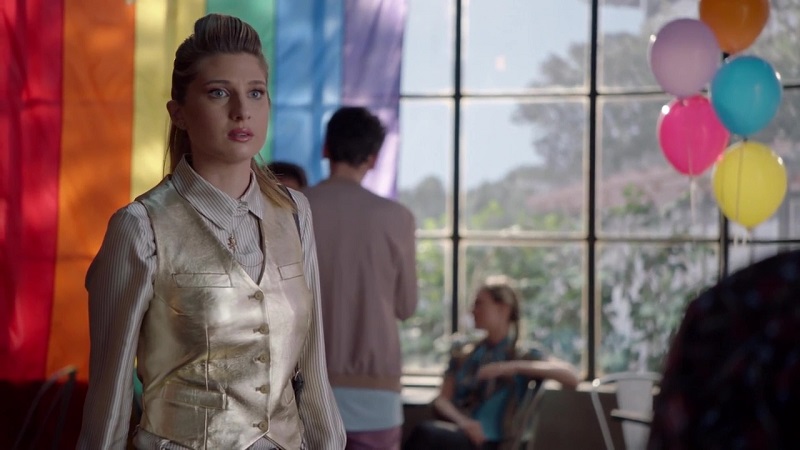
Nomi with her big girl rainbow underwear on.
“It made my life easier when I started living openly and honestly, so maybe you start there and just see how the rest of the stuff falls into place,” Professor Shane McCutcheon Paige Hewson suggested to Nomi and, this week, Nomi took her professor’s advice and dove headfirst into Cal U’s queer community, starting with queer performance art at Titanium. When Aaron declines to go along, Nomi reminds him that no one invited him. She drops a few gender studies buzzwords and it’s clear that Nomi’s been worshipping at the altar of Professor Hewson. Nomi doesn’t deny it, she’s her gay guru, her gayru.
Nomi’s first foray into queer culture starts out well enough: upon entry, she’s offered a pronoun pin from a cute baby gaysian and takes a seat at the bar. A girl takes the stage, looking like she might star as Alyson Hannigan’s character, Michelle Flaherty, in a forthcoming American Pie reboot, and says she’s going to share her coming out story via song. And by sharing, she apparently means yelling… yelling very loudly while holding a flute. It’s bad, it’s so, so bad. I’m less bothered by how bad it is — I mean, it’s queer performance art on a college campus — than I am about the fact that the only people in the room who seem to recognize it’s bad are Nomi and the baby gaysian. I refuse to believe that an entire crowd of queers would just accept this girl with a flute screaming at them and calling it a song… not in the age of Lizzo, no ma’am.
Realizing that this might not be for her, Nomi makes a quick exit and heads back to her apartment to rethink this whole “embrace queer culture” thing. Professor Hewson texts Nomi to ask how the day went. It strikes me as a little weird that a professor would text their student like this but I brush it off; after all, my gayru and I were exchanging messages all of the time. Nomi shares her frustrations over not being able to connect with queer culture and wishes there was some sort of crash course she could take. And that’s where we go from, “Aww, this is cute. Nomi connecting with her gender studies professor” to “Oh no, DANGER! DANGER WILL ROBINSON!”
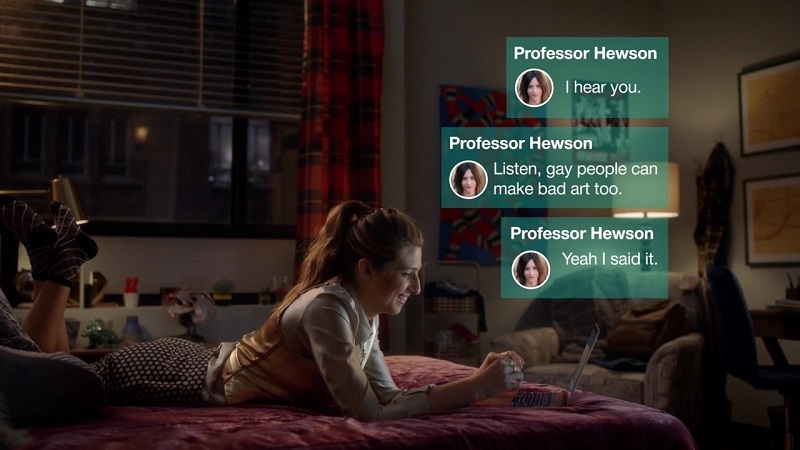
Bad gay art is possible, I saw Season Six of The L Word.
Professor Hewson volunteers to introduce Nomi to queer culture next week and then sends her a link to Halsey’s “Without Me.” Let’s take a look at those lyrics, shall we?
I said I’d catch you if you fall
And if they laugh, then fuck ’em all
And then I got you off your knees
Put you right back on your feet
Just so you can take advantage of me
And just in case that didn’t make her intentions enough, Professor Hewson invites Nomi to take their discussion offline. An actual phone conversation? In 2019? I think a “u up?” text would’ve been more subtle.
Oh, Shane… some things never change…
How to Get Away With Murder 514: “Make Me the Enemy”
Written by Natalie
Most people think I stopped watching Pretty Little Liars because they killed Maya (#TeamEMaya forever, though) but, honestly, that’s not it. I gave PLL up for the same reason I’ve dropped Manifest from my regular viewing: I don’t like a perpetual mystery. If I’m investing in a mystery, I want the mystery to be solved at some point… and I want to see progress towards that in each episode. But somewhere along the line, writers — perhaps fearful that nothing exists on the other side of a completed mystery — stopped trying to solve the mysteries they penned and became more invested in prolonging it, by whatever ridiculously implausible means necessary.
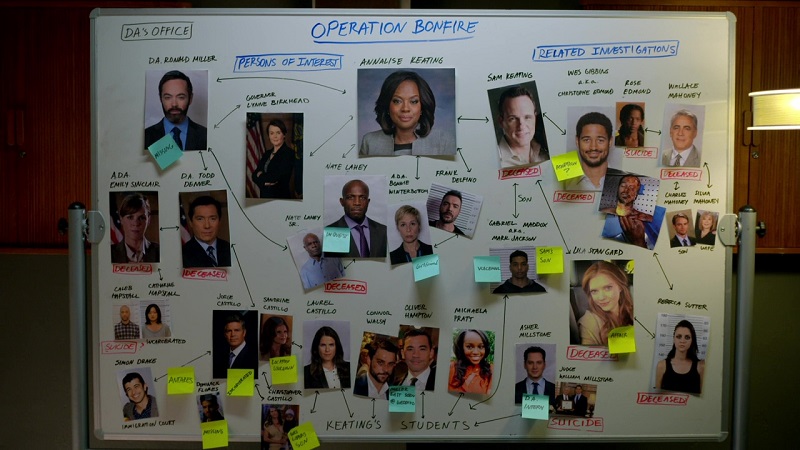
Your semi-regular reminder that Annalise Keating has not actually killed anyone.
Which brings us back to HTGAWM, a show that does that very thing every single season. It’s more contained than PLL or Manifest — HTGAWM‘s mysteries usually don’t extend beyond a season — but no less maddening. Ronald Miller? False flag. Governor Kerry Weaver? False flag. Emmett Crawford? False flag. Actual apparent murderer? Laurel’s brother that we didn’t even know existed until the final minutes of the penultimate episode of the fifth season. And, now, just like we do every season, we’ll have a jam packed season finale that tries to tie all these threads together in some nonsensical way that is, nonetheless, beautifully shot and skillfully acted. Yay us!
But, I digress — back to “Make Me the Enemy.”
Annalise calls over her new BFF, Tegan, to review the evidence that Governor Kerry Weaver gave her; she wants to know if she should believe the governor or if she should trust Emmett. Annalise points out that they don’t really know Emmett at all and Tegan reminds her that they don’t really know the governor either. But then we get to the real source of Annalise’s distrust: she’d invited Emmett into her world — welcomed him to her apartment and introduced him to her mother — and she takes his possible betrayal as a personal affront.
“I almost kissed him,” Annalise admits and, for a brief moment, a look of disappointment flashes on Tegan’s face. It’s long enough for Annalise to catch it, though, and she, seemingly, makes an apology for her behavior, “You had already left. I wasn’t even drunk. I just…I needed something. He was there.”
Tegan advises Annalise to use Emmett’s attraction to get information out of him and, though reluctant, Annalise puts on her fiercest red lipstick and asks Emmett for a chance to finish what they started after Christmas dinner. Emmett’s reluctant but Annalise hits him with a bit of reverse psychology — “you can’t stop being this firm’s good little boy” — before leaving his office and it doesn’t take long before Emmett runs back, asking for another chance.
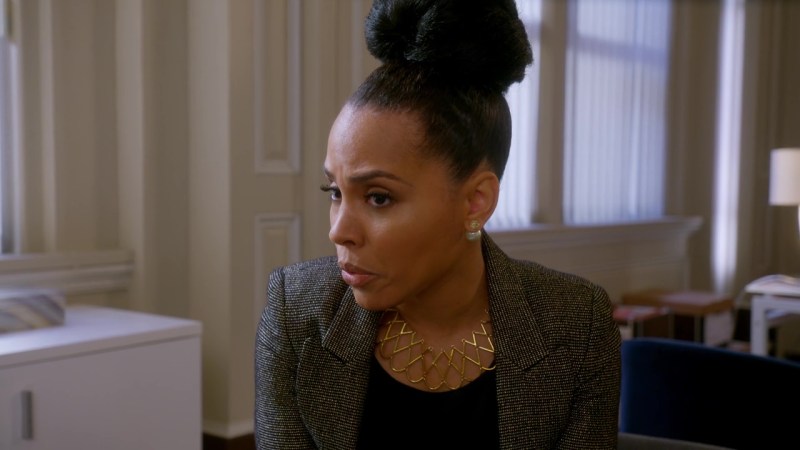
No wonder you drink, it’s the only way to cope with these crazy storylines.
Tegan has her own meeting with Emmett where he confronts her about the “Jane Doe” e-mail and, of course, she denies it. He seems to buy her explanation and quickly pivots to offering her his job: he’s thinking about leaving C&G to run for DA. Tegan runs back to Annalise to share the news. Later, Annalise circles back to Tegan’s office before her date with Emmett…only now, Tegan advises Annalise not to go. She had her own IT expert hack Emmett’s phone records and what she found corroborates the information that the governor gave Annalise.
“You trust your I.T. guy?” Annalise asks.
“I.T. woman,” Tegan corrects. “And yes. She’s my ex, and she’s a genius.”
“Then why’s she your ex?”
Listen, we all know that Tegan has a crush on Annalise. We’ve know this for a while but this and the earlier near apology feel a bit like flirting from Annalise, doesn’t it? I keep trying to let go of this ship but Pete Nowalk keeps trying to suck me back in.
The dinner that follows is, predictably, terrible, but it tees Viola Davis up to do that thing that only Viola Davis can do…the thing that keeps HTGAWM as must-see TV for me, despite the quasi-queerbaiting and ludicrous storylines. Enduring false flags seems like a small price to pay to see Viola Davis do this.
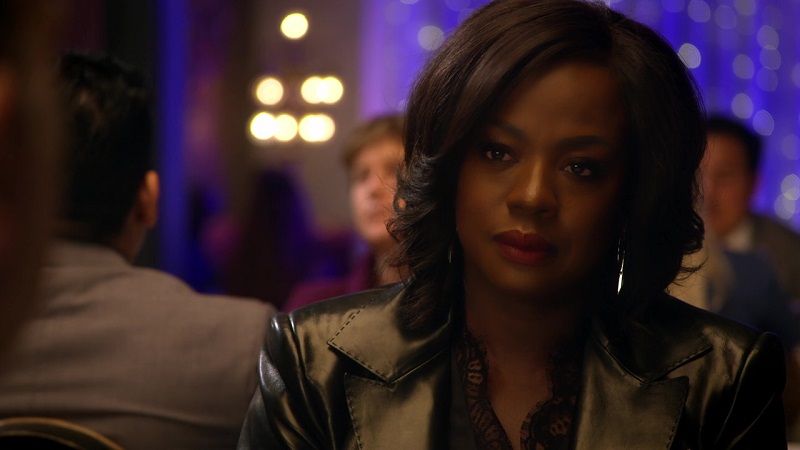
Dining with the enemy.
The pair argue over dinner. Emmett oozes every bit of his white privilege. He accuses her of attacking him, even though her voice isn’t raised and she’s just an equal participant in their argument. He says Annalise should “appreciate being with a man who calls you out on your crap.” How Annalise refrains from throwing her water in his face at that moment, I don’t know, but she does get up and walk out.
Emmett shows up the next day at Annalise’s apartment and he remains insufferable. He knows what Annalise and Tegan have been up to — thanks to a bug planted in Tegan’s office — and he denies having any role in Nate Sr.’s murder. I don’t care if he didn’t murder anybody, this dude is a creep and I need Annalise Keating to stay far, far away from him. But he keeps going after Annalise and she reads him FOR FILTH.
“You let fear control your whole life fear of losing status, losing face,” she says. “You [are] hiding behind your white boy privilege. You’d rather sit behind a desk than to actually make a choice that would cost you something. So of course I’m gonna believe that you killed Nate Senior, anything to hold on to every pathetic crumb you think is your birthright! But you know what? Game over! The world doesn’t belong to you and your good old boys anymore.”
BANG! That’s what attacking looks like, asshole.
Umbrella Academy
Written by Valerie Anne
Oh hello, I’m here to talk to you about the Umbrella Academy. There will be some mild spoilers afoot so if that’s not the kind of thing you’re into keep scrolling please!
I’ll be honest with you, Heather asked me to write a full stand-alone review of this show, and while I enjoyed it well enough to finish it in one weekend, I wasn’t sure it warranted a full review. It didn’t have any (openly/obviously) queer women, though it did have a queer man. It wasn’t overly feministy, though Ellen Page, Emmy Raver-Lampman, Mary J. Blige, Jordan Claire Robbins (and one other woman I don’t want to spoil for you in case you love her like I do so you can get the joyful surprise I experienced) did amazing work. That said, I did enjoy it; the concept was wild, and it had a very comic booky feel. I had some mild issues with their approach to when they would conveniently use/forget the sibling bond between seven children raised together from birth, but to be fair these children were also emotionally and physically abused and neglected.
The show overall explored the effects of these various traumas, the aftereffects of growing up special and then fading out of the limelight. Also, the cycle of abuse, addiction, mental illness, complicated family dynamics, and time travel. You know, the usual stuff.
One thing I do want to call out is that Ellen Page, despite the only relationship of hers mentioned being with a man, was delivering some really strong soft butch energy and wore some great (read: gay) outfits.
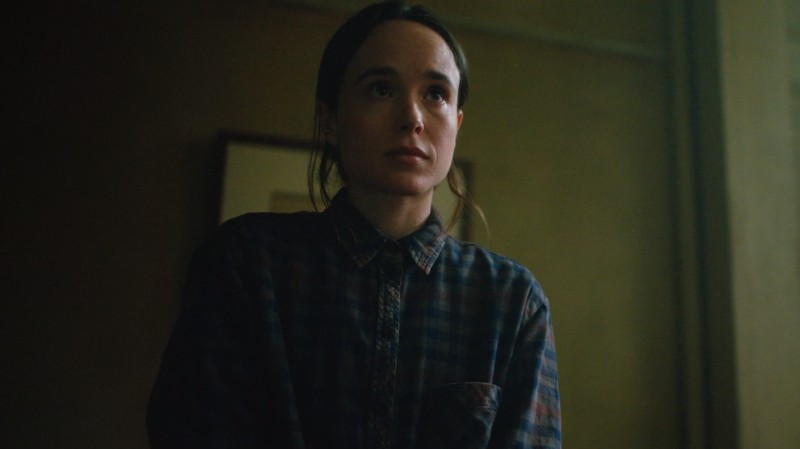
Plus she danced like the precious little dork she is in one of the best scenes of the whole show.
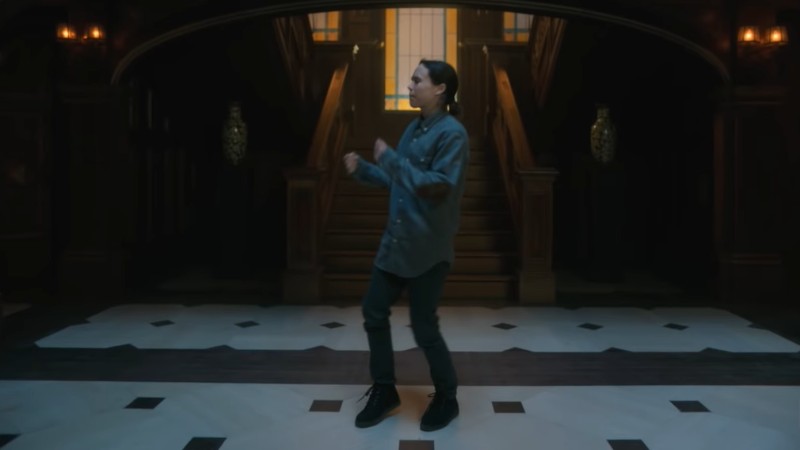
Overall, I do recommend checking it out if you’re into grittier stories about people with powers – this is not your Supergirl story of hope or even your Runaways more-dusty-than-gritty dark tale. It’s more in line with something like The Magicians, with characters that are constantly making you yell WHAT ARE YOU DOING at your screen but in a fun way? It’s also funny when it’s not breaking your heart, and clever when it’s not stressing you out. And I cannot overstate enough how amazing Ellen Page is. And I had never seen Emmy Raver-Lampman in anything, but I’m in love now.
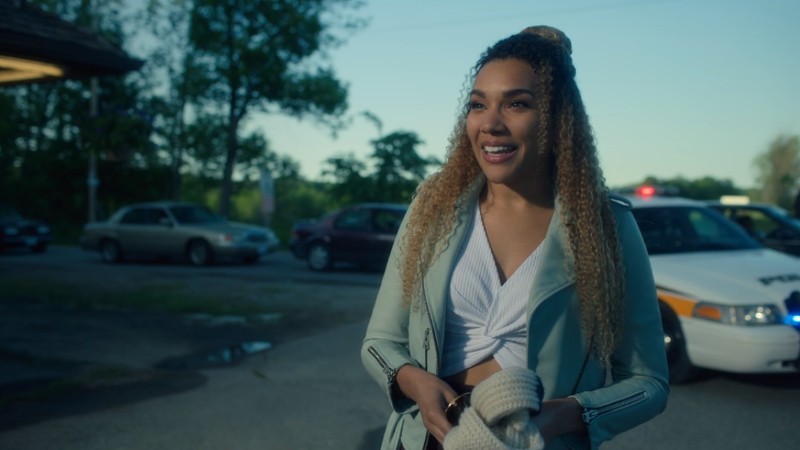
Quick Hits
High Maintenance 305: Payday
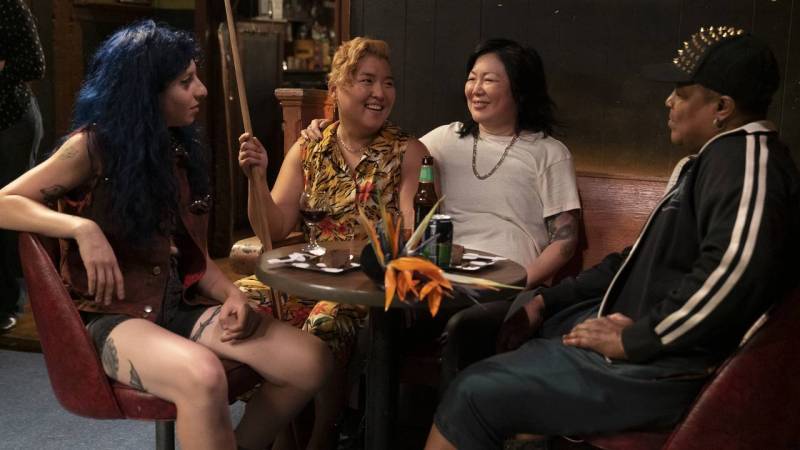
Hey are you in the mood to see Margaret Cho have ten different kinds of kinky sex with her hot girlfriend? Do you wanna see a scene of lesbian and queer people hanging out that is actually set in Ginger’s, and it’s super diverse and beautiful and I love our community and being queer and all the weird ways we have relationships? I don’t know if that last part was a question or what. I hope that y’all are watching this show I have told you to watch 100 times. I also once again must point out that I hate weed humor and weed movies but this show is nothing like those jokes.
High Maintenance so deftly spotlights and lovingly skewers its ephemeral weekly characters, interrogating some non-traditional aspect of a relationship and how it bumps up against the inevitable arrival of our star, the weed delivery guy. This week’s reflected, again, a showrunner who actually knows the community she’s writing about, and the weird intersections of love, sex and commerce in relationships that resist hegemonic structures, often leading us into unfamiliar landscapes we have to navigate without maps, with nobody but each other to tell us we’re going in the right direction. — Riese
Broad City 505: Artsy Fartsy
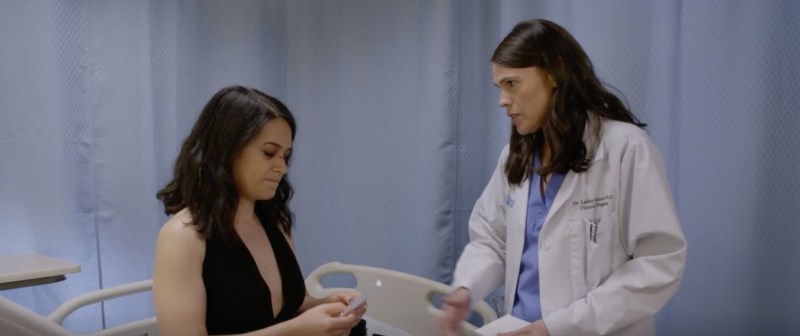
Ilana has been in love with Abbi and highly interested in having sex with her since inception — she’s mad when she learns Abbi hooked up with a girl in college, she’s frequently proposing future life situations to her that essentially sound like lesbian relationships. This week, Ilana was confronted with a turning point in her relationship with Lincoln and Abbi facing a similar moment regarding her relationship with herself. When negotiating their “contract” for the ensuing year — including items like how non-monogamous they could be (Ilana had pictures of specific girls, including Abbi, in her portfolio!), how many rom-coms Ilana would watch to please Lincoln — Ilana learns that Lincoln’s long term goals include moving to Maryland to start a dental practice with his brother and having children, which’s something she can’t fathom being interested in for over a decade and maybe possible never at all. Ilana then does what any self-respecting queer woman does following an unexpected breakup — she gets VERY stoked about her Single Ladies Future with her BFF and all the work and life goals she can conquer as an Independent Woman.
But Abbi’s been on her own journey all episode, catching up with an insufferable friend from art school and attempting to both cater and attend a MOMA opening in a scene reminiscent of her attempt to attend a date with Trey AND dinner with Ilana’s family a few seasons back. After meeting an artist she’s obsessed with, Abbi faints, which lands her in the hospital under the care of Professional Lesbian Cameo Artist Clea Duvall. There’s a spark that takes Abbi by surprise and eventually, as she later relays to Ilana, she realizes that the only reason she wasn’t asking Leslie out was ‘cause she was a woman, but why should that matter? And so she did, and so they’re going on a date, and then Ilana is both supportive and clearly struggling inside while making really fantastic facial expressions. I cannot wait to see where this goes and I love that now BOTH stars of this groundbreaking show are queer Jews! Yay! — Riese
Brooklyn Nine-Nine 607: “The Honeypot”
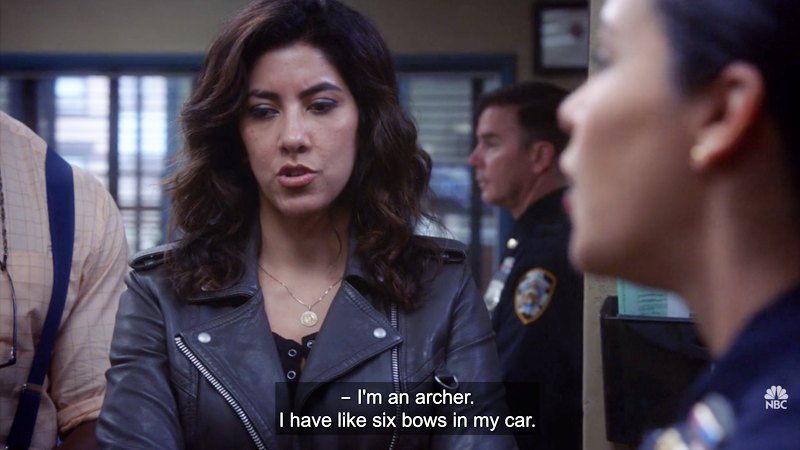
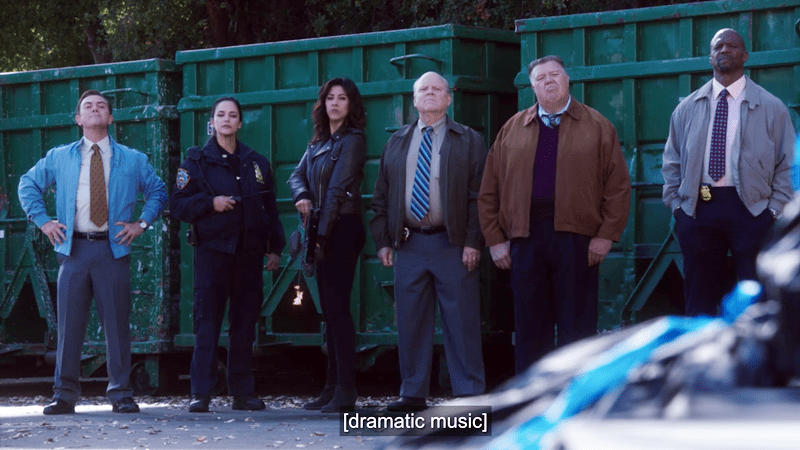
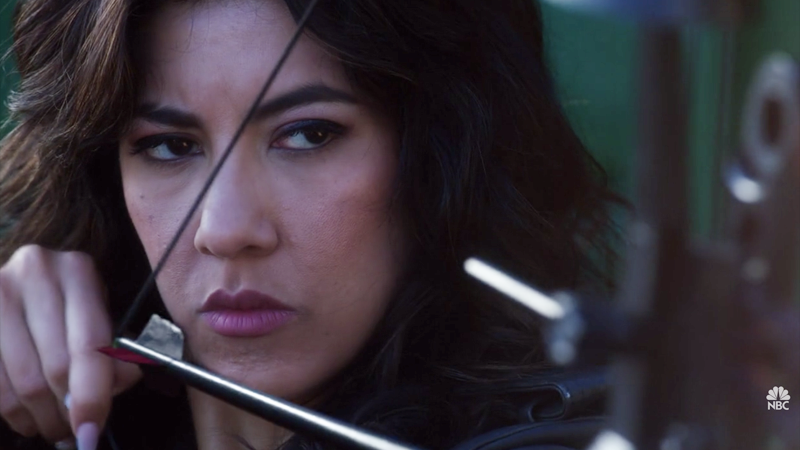
— Heather
Legacies 111: “We’re Gonna Need a Spotlight”
This week’s monster was a UNICORN so no one was particularly worried about it, but it turns out the unicorn was just a cute carrier for a possession slug that makes everyone act like they’re drunk. Josie came back to school from her vacation intending to avoid Penelope, but after she gets the slug in her brain, she marches right up to her ex-girlfriend and says she’s done being good and asks her to ditch the talent show with her.
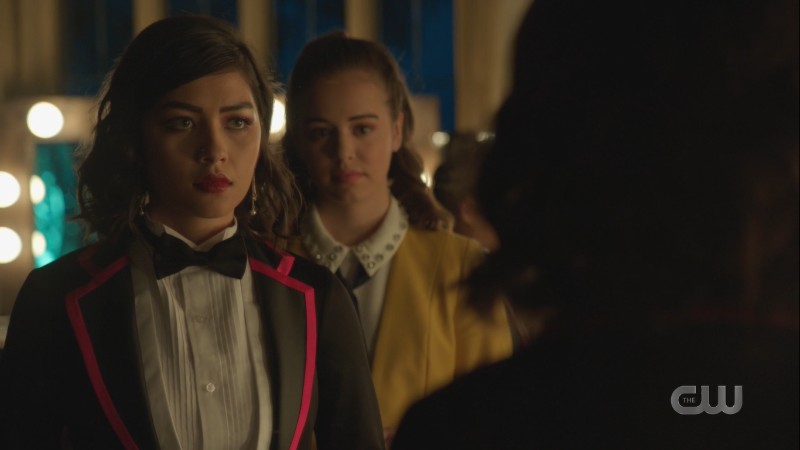
No time to change out of your Warbler cosplay.
Penelope had given Josie a note but Josie didn’t read it so Penelope recaps it for her in the form of a kiss. Josie, even drunk on slug juice, knows she should never get back together with Penelope, but doesn’t mind if they keep kissing for now.
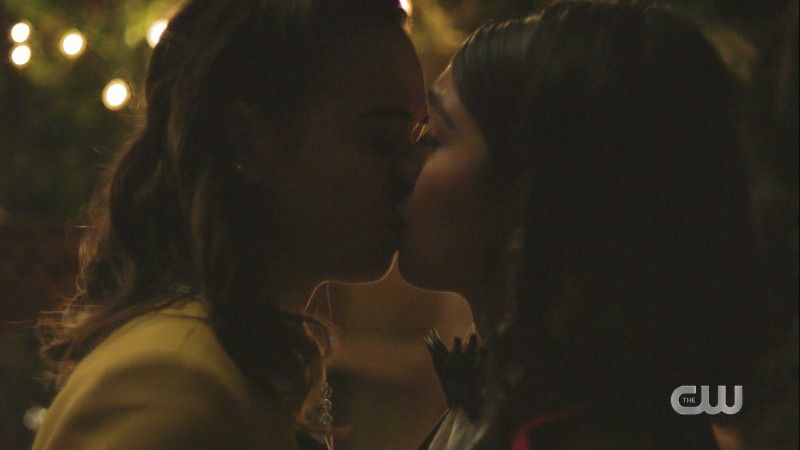
Unicorn magic.
The thing with being drunk on slug juice, though, is that eventually you become that girl in the bar who is suddenly obsessed with everyone doing a shot even though no one else cares about the shots and she won’t stop SHOUTING ABOUT IT except instead of shots it’s the Urn. Luckily before they can get the urn, Lizzie intervenes, gets Josie unpossessed, and hugs her sister, still feeling some residual bonding feelings from the alternate reality where she killed her sister.
Lizzie even turns over the witches’ talent show performance to her twin and Josie sings a song about stepping out of the shadows and into the light while Penelope and Lizzie watch on proudly from their position as backup dancers.
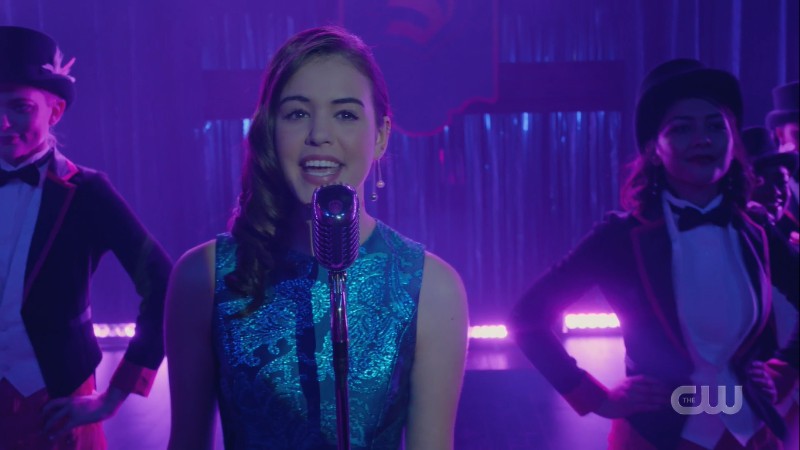
I’m a sucker for a big musical number.
It’s very sweet and cute and I like this silly show very much. I want some Josie/Penelope flashbacks though, I want to see how their relationship went down the first time around to know if I really should be rooting for them to figure it out or not. — Valerie Anne
Siren 205: “Primal Instincts”
Siren opens the night of our trio’s little makeout sesh. The three of them are doing this
cute little triple spoon/mermaid-in-the-middle kind of snuggle.
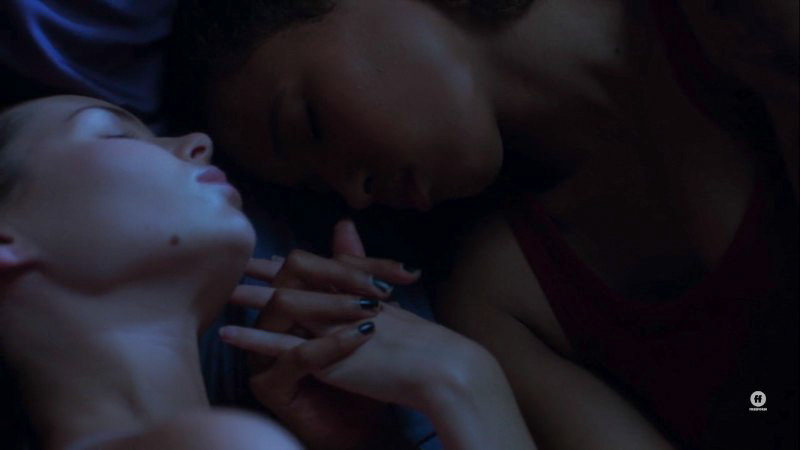
I’m in for the throuple but I still think Maddie would make a great big spoon for Ryn.
There are soft, sleepy touches and hand caresses as they come to. Ryn says she likes waking up between Maddie and Ben and wonders why they stopped after kissing. Maddie says they’re following Ryn’s pace, but Ryn is ready for more. They have to give her sort of a sex talk because I guess mermaids only have sex for mating and it mostly involves beating the mermen up. But Maddie explains that on land they have sex for pleasure and some people call it “making love” – so Ryn tells them she wants to make love with Ben and Maddie.
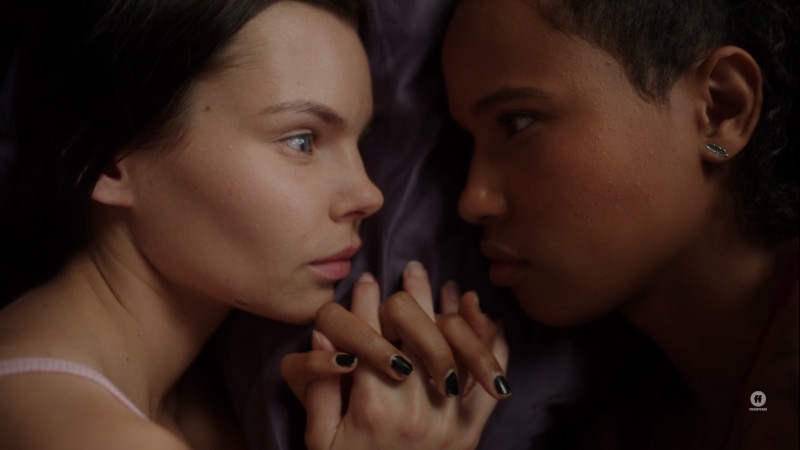
I loved the way Ryn emphasized “make” when talking about wanting to “make love.”
Ben and Maddie seem to approve this plan, though it’ll have to wait for a future episodes because their horde of rogue mermaids is causing more mischief. — Valerie Anne
S.W.A.T. 216: “Pride”
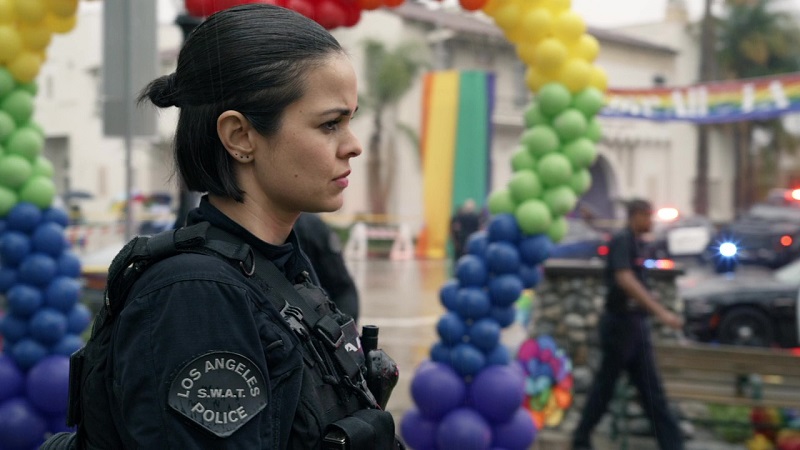
As I mentioned in my last review of S.W.A.T., this show isn’t your typical CBS procedural; it takes the same formula that CBS viewers are used to and injects it with some progressive substance. It addresses series issues like gun control, race, police corruption, gender and sexuality in ways that you wouldn’t expect from a CBS procedural. In last night’s episode, the show continued that tradition: telling the story of a rapid right-wing radio listener who attacks a Los Angeles Pride event. It starts with a Charlottesville-like hit-and-run and then, instead waiting until his community is attacked again, an local LGBT and guns rights activist holds the radio host and his staff hostage. The team’s able to end the hostage standoff with no injuries and, eventually, take in the domestic terrorist and his band of minions who were looking to attack the Pride parade.
Throughout the episode, Chris is torn: she understands her role as a member of LAPD SWAT but, as a member of the LGBT community herself, she can relate to the activists’ pain at hearing folks spew hate. I wish they’d taken the opportunity to pair Chris with Hondo during this operation because a lot of what she externalizes in “Pride” — namely being part of a community that feels unprotected by the police force — mirrors what he’s been grappling with all season long. — Natalie
Charmed. 112: “You’re Dead to Me”
Here we are, it’s 2019 and Mel Vera is definitely back on her bullshit. You know how if she spends time, any time at all, with Niko then the whole world could potentially fall apart or blow up to smithereens or something like that? On the count of that spell Mel put Niko under back in the fall? Great, then you’re all caught up. Guess what Mel is doing anyway? SPENDING TIME WITH NIKO!!
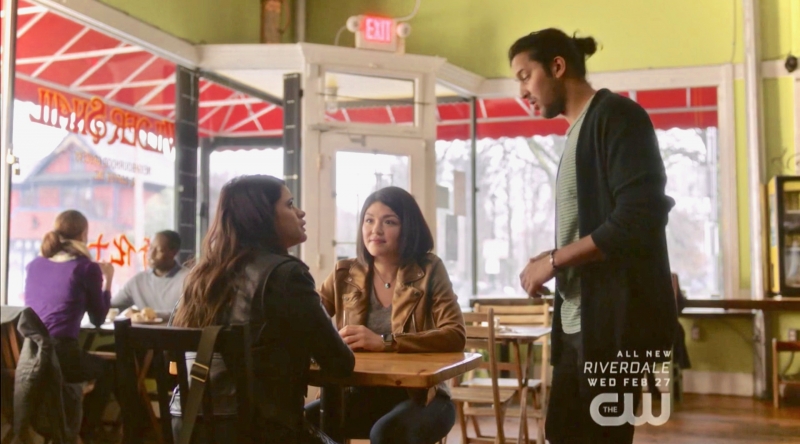
Now that’s what I call a bad first date.
The slippery slope starts with an ill-advised Instagram binge and ends with Mel agreeing to meet Niko for coffee (the universe helped us along by having Niko pick their first date spot for the clandestine meeting, though of course Niko doesn’t remember any of this). The whole time Niko goes on and on: “Wow Mel! How did you guess my coffee order?” and “Wow! Doesn’t this feel like déjà vu?” Because of course it feels like déjà vu — they have done all of this before!
Be careful about playing with fire, Mel. You’re about to get burned. — Carmen
Winter 2019 TV Preview: All The Lesbian, Queer and Bisexual TV Coming Your Way
Let’s ring in the new year where we rang it out: on the couch, watching television! What we have here is all your 2019 television premiere dates for all your favorite new and returning shows.
The Fall 2018 season was pretty incredible for representation — it seemed like I had to update the TV Preview every few days with a new lesbian or bisexual character popping up. Unfortunately, most of the new shows on my radar for 2019 aren’t, as of yet, promising a whole lot of lesbian and bisexual women characters — but there sure are a lot of gay men, especially in a few supernatural and comics-inspired programs I’m keeping my eye on in case they choose to toss us a lesbian bone. Not a dead lesbian bone though, we’re past that now.
So, without any further ado except for the rest of this paragraph, let’s get into it! Shows that took less than a one-month break between their last 2018 episode and their next 2019 episode are mentioned in bold italics, but are not given full pics and descriptions.
This post will be updated as events warrant.
January
Grown-ish (Freeform) // January 2nd // Season Two
// watch the trailer //
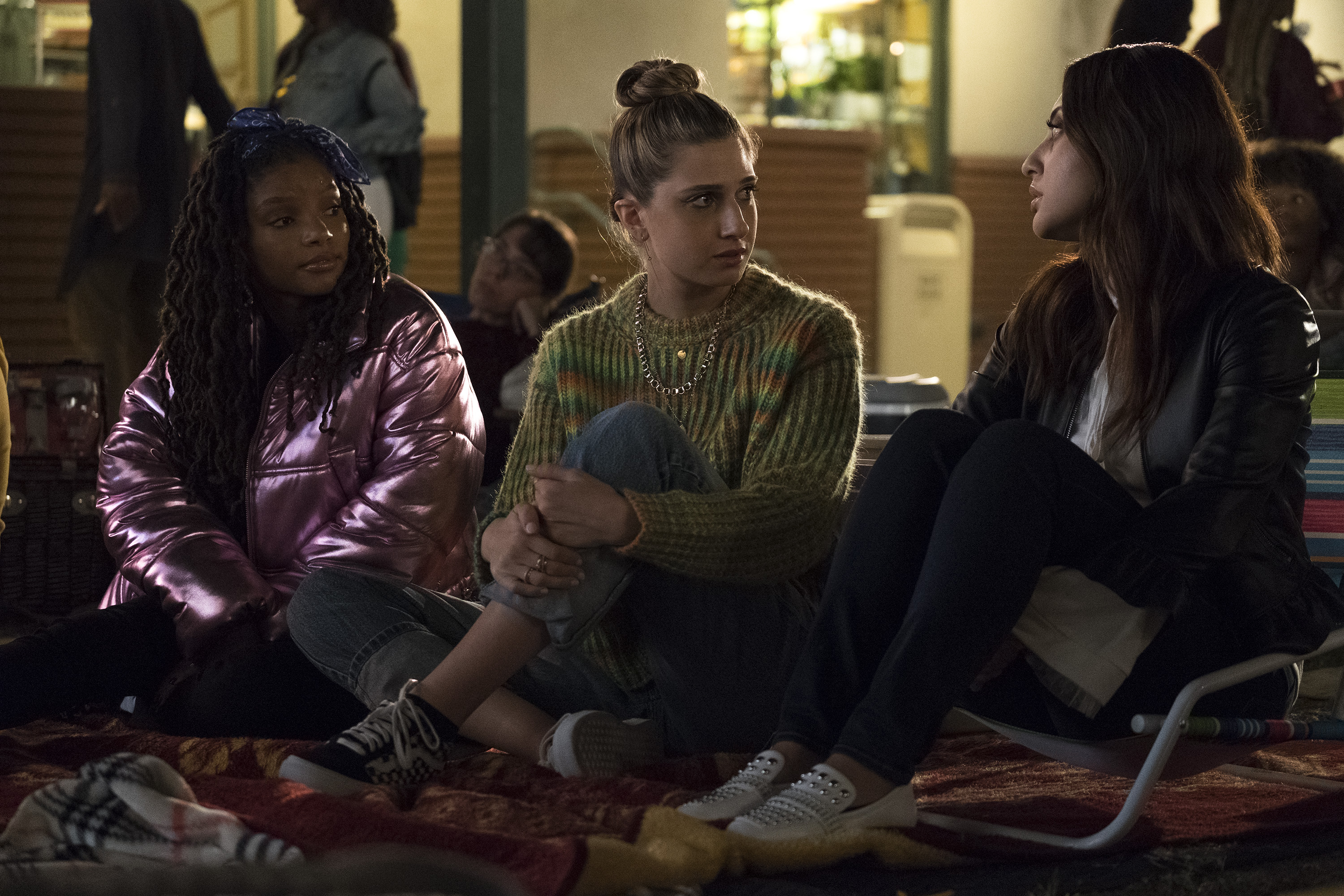
(Freeform/Tony Rivetti)
Grown-ish is back and so is Zoey’s bisexual bestie Nomi, who will start tentatively exploring her school’s queer community mid-season. This show is really cute and fun and if you’re not watching it, I bet if you started watching it you’d be like, “Aw! This is cute and fun but also has an awareness of social issues! I’m so glad I’m doing this for myself!”
Fresh Off The Boat (ABC) // Season Five Returns January 4th
God Friended Me (CBS) // Season One Returns January 6th
Mainfest (NBC) // Season One Returns January 7th
Good Trouble (Freeform) // January 8th // NEW
// watch the trailer //
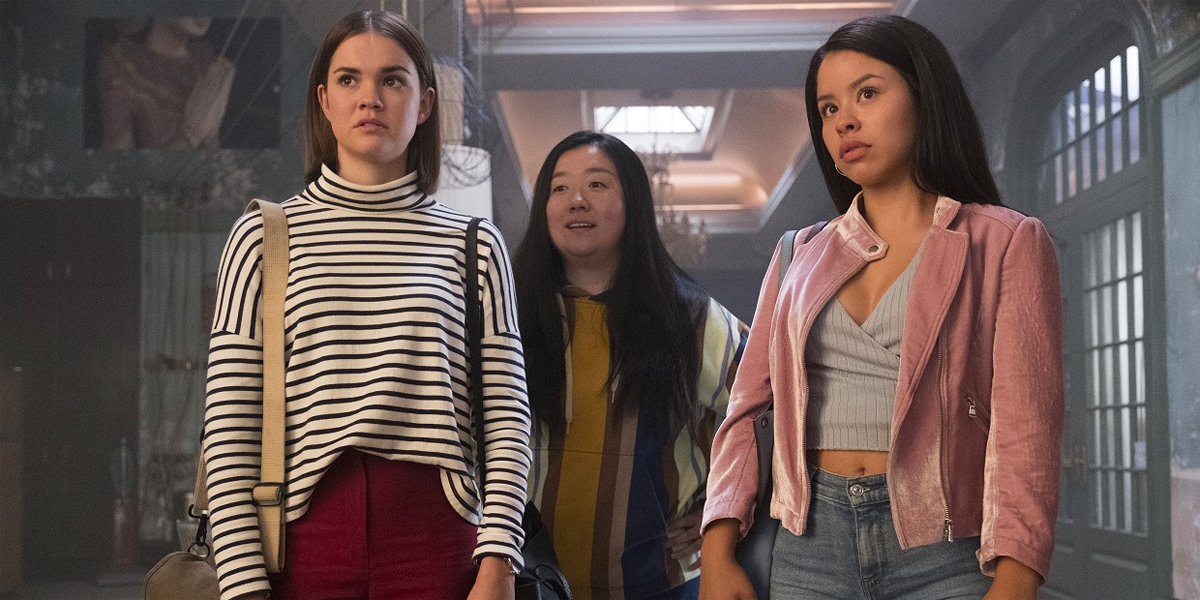
Good Trouble picks up where The Fosters left off: with Mariana (Cierra Ramirez) and Callie (Maia Mitchell) headed north, from their sleepy San Diego suburb to the bright lights of Los Angeles, to start their new jobs. Most exciting of all: their new building manager and de facto house mother, Alice Kwan (Sherry Cola), is a selfless and closeted-to-her-family Asian-American soft butch lesbian.
Brooklyn 99 (NBC) // January 10th // Season Six
// watch the trailer //
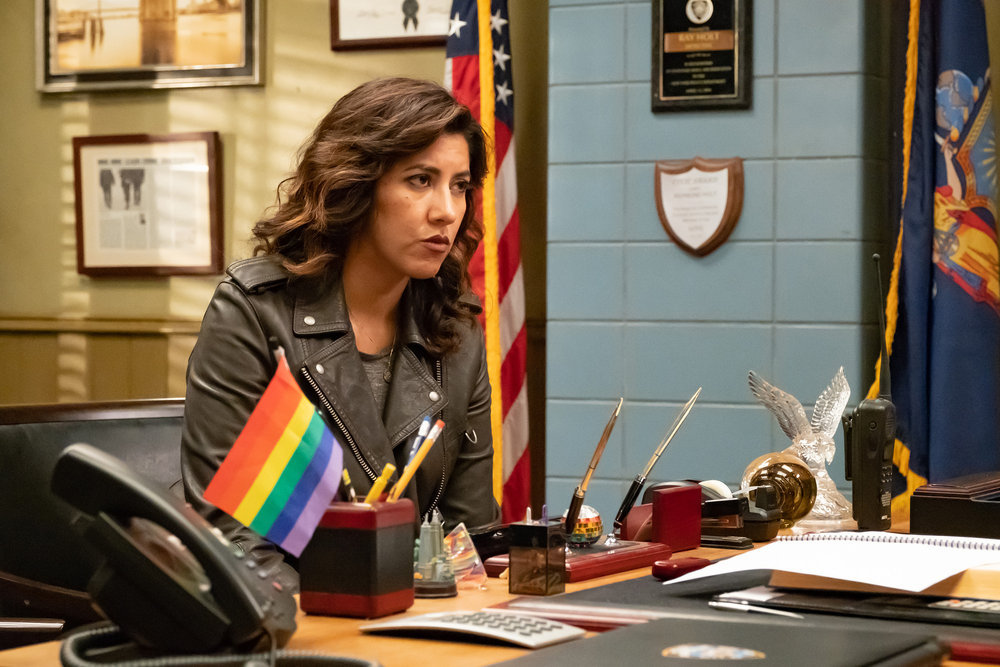
BROOKLYN NINE-NINE — “Honeymoon” Episode 601 — Pictured: Stephanie Beatriz as Rosa Diaz — (Photo by: Vivian Zink/NBC)
Now on a new network, Brooklyn 99’s Season Six will include an episode focusing on the #MeToo movement, directed by Stephanie Beatriz, and will open with Jake and Amy on their honeymoon.
Law & Order: Special Victims Unit (NBC) // Season 20 returns January 10th
S.W.A.T. (CBS) // Season Two Returns January 3rd
The Good Place (NBC) // Season Three Returns January 10th
Crazy Ex-Girlfriend (The CW) // Season Four Returns January 11th
Sex Education (Netflix) // January 11th // Season One
// watch the trailer //

This eight-episode British dramedy stars Gillian Anderson as a sex therapist with a socially awkward son who, with the help and urging of his classmates, starts his own “underground sex therapy clinic” at school. Otis has a black gay best friend, but as far as queer girls go all we’ve spotted so far is a girl/girl couple in the preview who are only listed as being in one episode on imdb. Still, it looks really cute!
The Flash (The CW) // Season Three Returns January 15th
This Is Us (NBC) // Season Three Returns January 15th
Schitt’s Creek (Pop) // Season Five // January 16th
// watch the trailer //
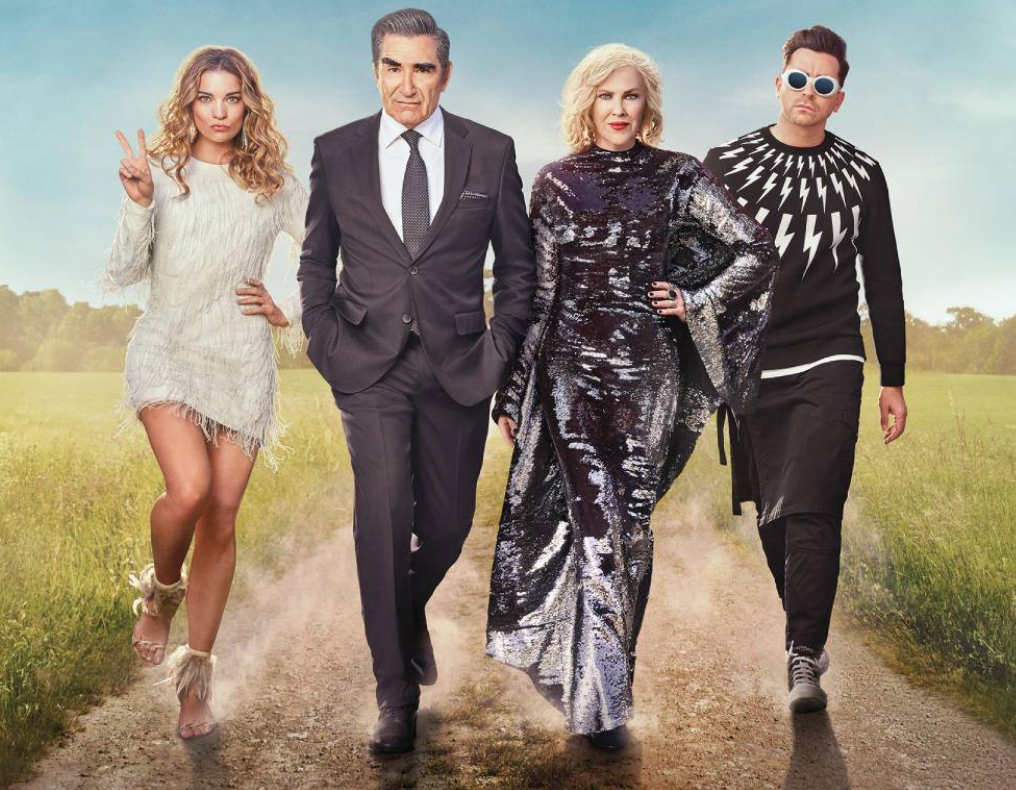
Black lesbian town councillor “Ronnie” isn’t really a main character on Schitt’s Creek and that’s really my only complaint about this smart, clever, campy Canadian sitcom everybody seems to have discovered within the past few months. Catherine O’Hara and Eugene Levy shine as parents of a family who suddenly lost its wealth and are forced to live in a motel in Schitt’s Creek, a town they originally purchased as a gag gift, and Daniel Levy plays David Rose, a delightfully bitter young bisexual man. Plus, queer actress Emily Hampshire!
Riverdale (The CW) // Season Three Returns January 16th
All-American (The CW) // Season One Returns January 16th
Star Trek Discovery (CBS All Access) // January 17th // Season Two
// watch the trailer //
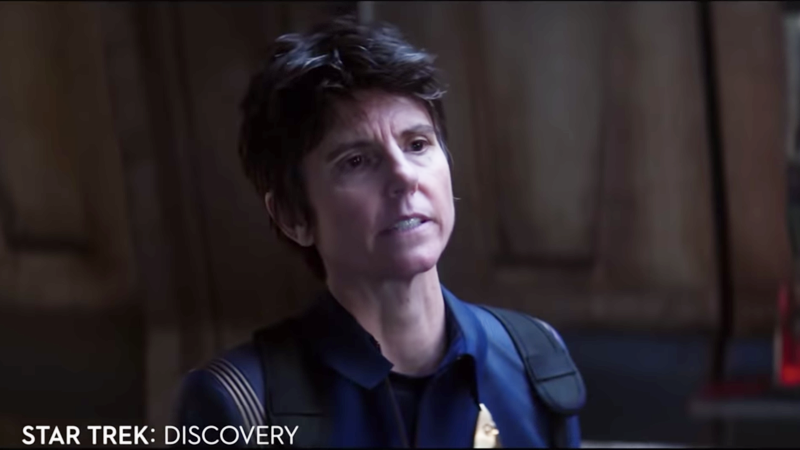
Star Trek has the most bizarre relationship with the gays. Kirk and Spock shippers are the original TV fandom and wrote fan fiction via printed ‘zines before the internet was even born! Once the internet was born, Janeway and Seven of Voyager became the go-to queer subtext sci-fi couple for decades. Finally, in 2018, Discovery introduced the franchise’s first canonically gay couple, Paul Stamets and Hugh Culber, and then promptly murdered Culber. Through the magic of science fiction and internet outrage, Culber is returning for season two. Also joining the cast: Tig Notaro as (presumably lesbian) Chief Engineer Denise Reno, who, according to the trailer, can best be described as “Tig Notaro in space.” I can’t wait! ( – Heather )
Grey’s Anatomy (ABC) // Season 15 Returns January 17th
How To Get Away With Murder (ABC) // Season Five Returns January 17th
Shameless (Showtime) // January 20th // Season 9B
// watch the trailer //
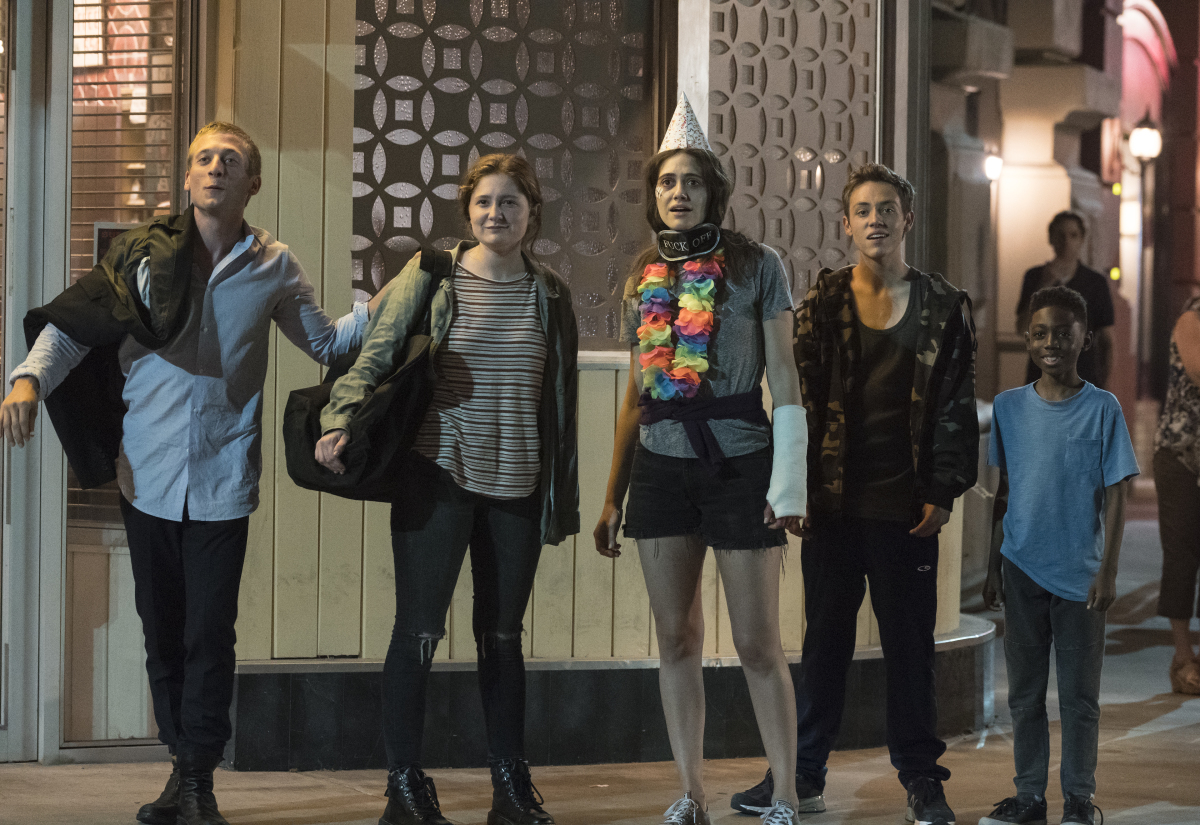
Photo: Isabella Vosmikova/SHOWTIME – Photo ID: SHAMELESS_907_2424
The back half of Shameless’s Ninth Season returns after an extended break — oddly, after all this time, the now-totally-uneven ensemble dramedy about the tough-luck Gallaghers has managed to feature a record number of queer female characters, although many have been pretty recklessly constructed. Most recently, Debbie has considered her Sapphic side through a brief fling with hot construction worker Alex, while Veronica seems to have abandoned hers in Svetlana’s absence. Honestly I can relate to abandoning things in Svetlana’s absence, I miss her with all my heart. I can’t stay away from this show regardless of its missteps. Previews suggest that Debbie appears to remain committed to smashing the patriarchy in Season 9B and also identifies as a “sexually confused Teen Mom.”
High Maintenance (HBO) // January 20th // Season Three
// watch the trailer //
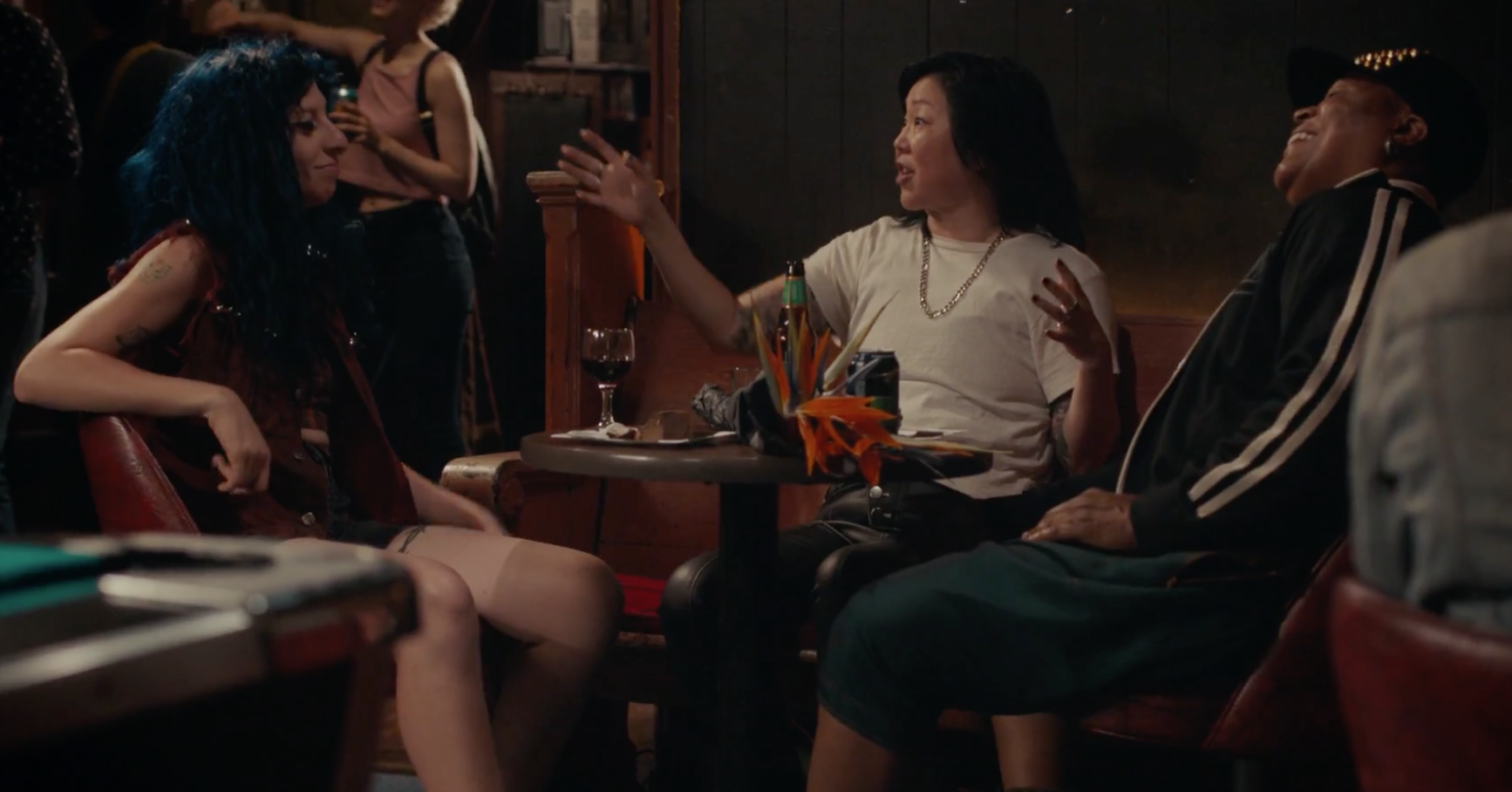
Season Two of High Maintenance was one of the best shows of 2018, and casting notices for Season Three have been a delight in and of themselves — in addition to opening all roles to non-binary actors, we’ve got gay Latinx construction workers, hippies in Poughkeepsie, and characters described using clauses like “got into a Seven Sisters school back in the day but dropped out” and “the kind of woman who definitely owns some Birkenstocks and has energy crystals in her home.” Season Three will feature guest spots from Margaret Cho (spotted hanging out with other QPOC and kissing Hye Yun Park in the trailer) as well as Rosie Perez, Jemima Kirke (Girls), Annie Golden (Orange is the New Black) and Guillermo Diaz (Scandal).
Supergirl (The CW) // Season Four Returns January 20th
Charmed (The CW) // Season One Returns January 20th
Black Lightning (The CW) // Season Two Returns January 21st
The Magicians (SyFy) // January 23rd // Season Four
// watch the trailer //
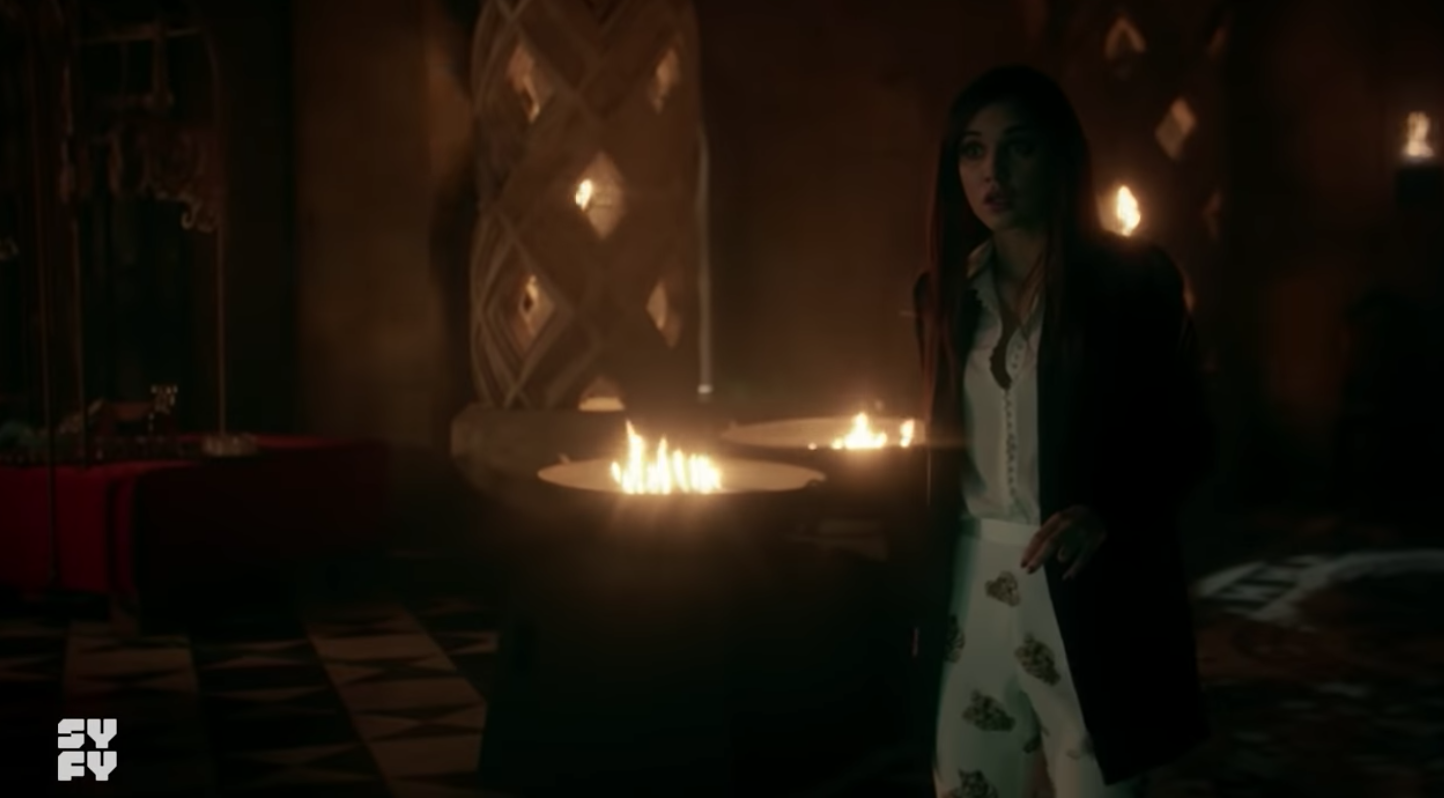
Aside from Daniella Alonso’s Pirate King, most of the queer vibes in Season 3 of The Magicians were from the magical men. However, according to interviews, Margo is bisexual, so maybe we’ll see more of that this year…then again, everything got turned on its head so really it’s anything goes in Season 4. All I know for sure is that no one really reads as particularly straight on this show. ( – Valerie)
Broad City (Comedy Central) // January 24th // Season Five
// watch the promo //

Broad City‘s Season Five will, sadly, be their last. According to a recent interview in The New York Times, Abbi is going to date a woman this year, which means this show has TWO bisexual protagonists. How about that.
JACOBSON I really feel like our show has been so queer from the get-go.
GLAZER Queerer than we knew. Behind the scenes, in front of the cameras. Everyone who works with us has gotten queerer and queerer in the past six years. I swear to God.
Siren (Freeform) // January 24th // Season Two
// watch the trailer //
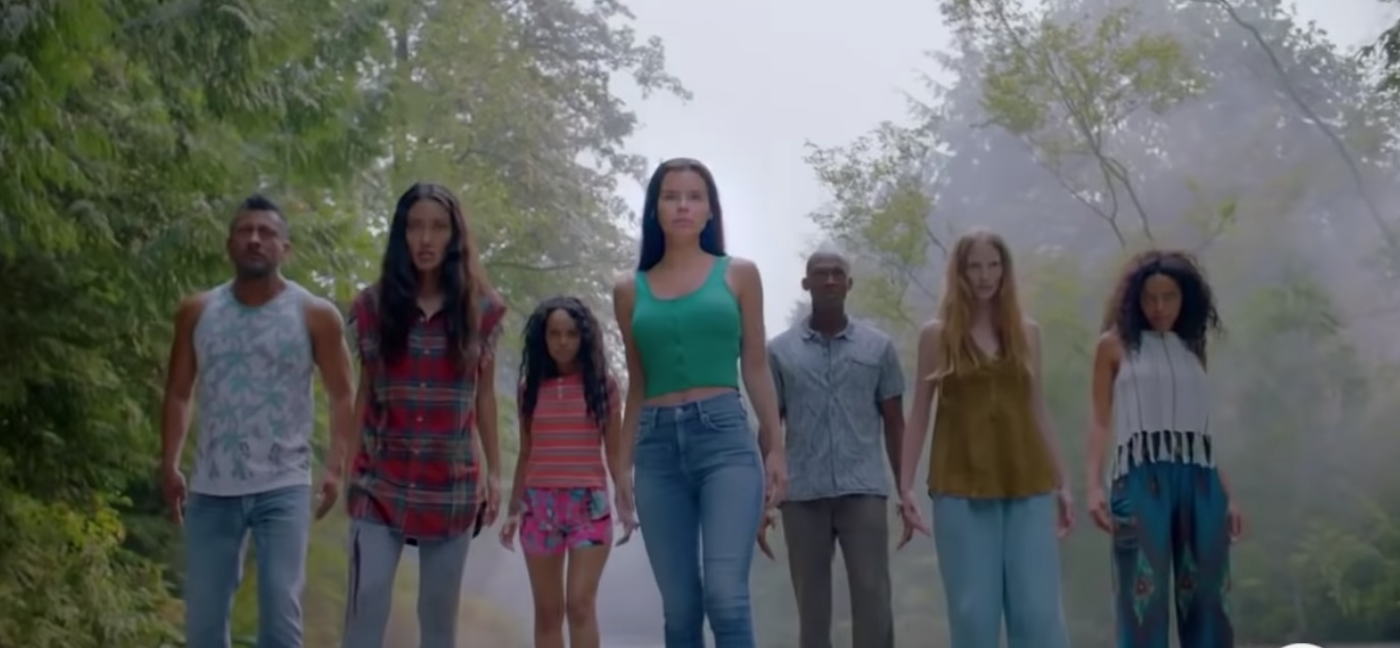
Season 2 of Siren promises to give us more of the throuple action from Season 1, where mermaid Ryn seems into both Maddie and her on-again, off-again boyfriend Ben. And it also promises more mermaids, so here’s hoping all mermaids are sexually fluid! It seems some of them will be working against Ryn and some will be working with her to just try to blend in and save their species, but hopefully we get some more lady-loving merladies this year. ( – Valerie)
Legacies (The CW) // Season One Returns January 24th
RENT! Live (Fox) // January 27th
// watch the trailer //

In a moment that will undoubtably make me feel elderly, RENT! Live is coming to our teevee screens this January, starring Vanessa Hudgens as Maureen and Kiersey Clemons as Joanne. This will also be a great opportunity to see if Mark is less annoying when he’s not played by a white actor!
February
Russian Doll (Netflix) // February 1st // NEW
// watch the trailer //
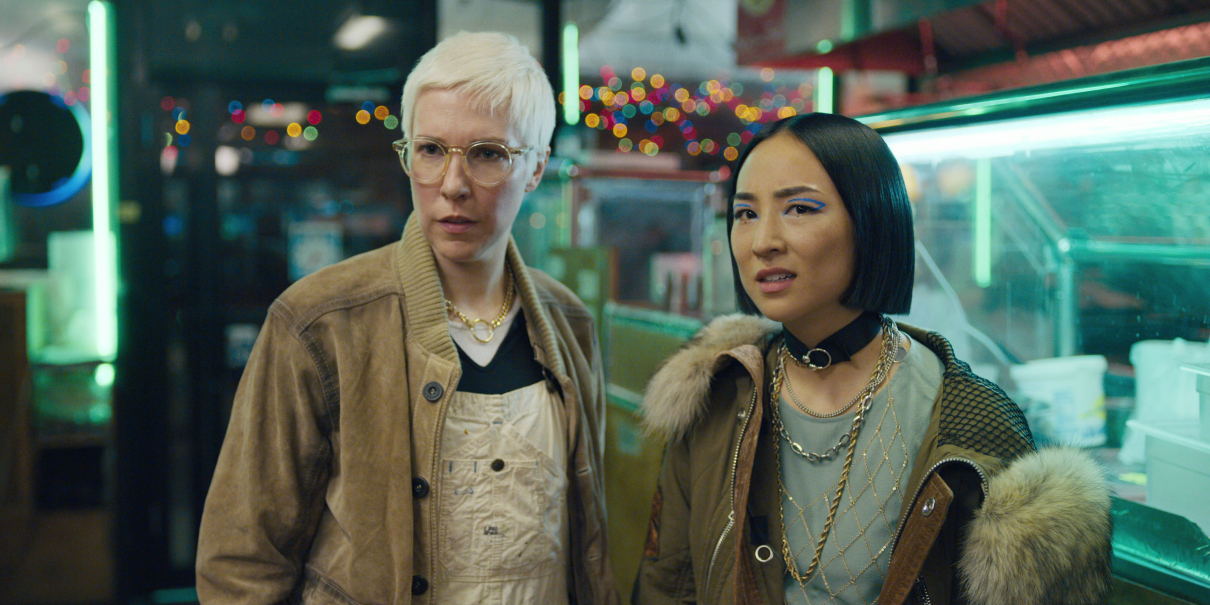
Rebecca Henderson as Lizzy and Greta Lee as Maxine in “Russian Doll”
I initially wrote, “f this show is somehow not even remotely gay, I will eat my hat!” and good news — I did not have to eat my hat! Rebecca Henderson (who is married to co-creator Leslye Headland) plays Lizzie, a lesbian who enjoys group sex and also one-on-one-sex and wearing overalls! Natasha Lyonne co-created and stars in the “existential adventure show” about an inescapable New York City party, created by an all-female writing team, directed by lesbian Jamie Babbitt and featuring actors including Greta Lee, Elizabeth Ashley, Rebecca Henderson, Chloë Sevigny, Dascha Polanco, Ritesh Rajan and Jocelyn Bioh.
American Housewife (ABC) // Season Three returns February 5th
One Day At a Time (Netflix) // February 8th // Season Three
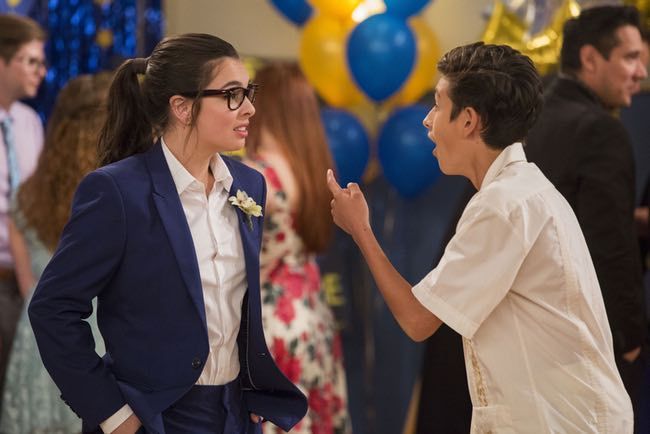
[Season Two Photo]
Walking Dead (AMC) // February 10th // Season 9B
// watch the trailers //
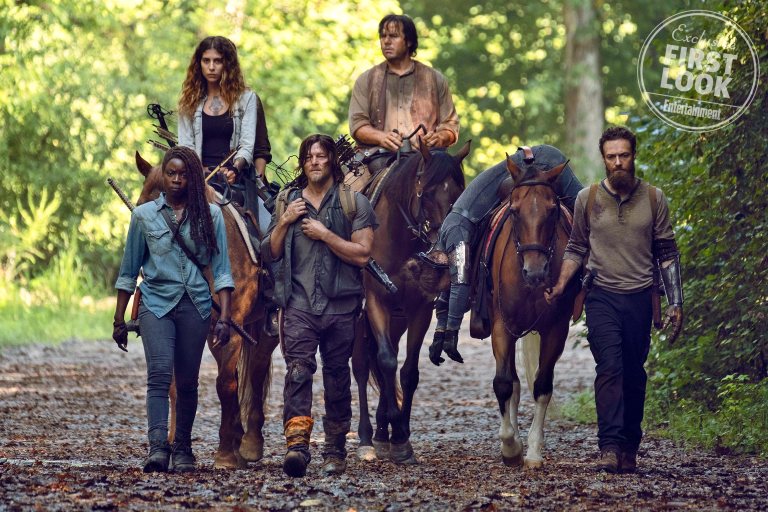
The Walking Dead
Nadia Hilker, Danai Gurira, Norman Reedus, Ross Marquand, Josh McDermitt
This is a show about, I believe, zombies! There’s a girl named Tara in it and she’s gay, but every time she dates a girl, that girl gets killed. Am I right so far? Many moons ago, the actress who plays Tara told AMC, “I’m excited for what’s to come in Season 9. I feel like it might be such a different equation. It might not just be war. Maybe there’s something else in store. That sounds exciting to play. Maybe instead of constantly fighting for survival, there’ll be some rebuilding and normality. I don’t know, but I’m excited to see if that could possibly happen!”
Boomerang (BET) // February 12th // NEW
// watch Lena Waithe on the making of Boomerang //

Lala Milan as Tia (Photo: Jace Downs/BET)
Lena Waithe and Halle Berry are the powerhouse team behind the television sequel to the 1992 film “Boomerang,” which follows the children of the original story’s three stars. Lala Milan plays Tia, described as a “misguided performance artist with high ambitions” who “is a classically trained dancer who wants to topple the patriarchy. She’s charismatic and wildly unique. Tia is an activist at heart, but she doesn’t mind being a little ratchet every now and then” and Kimberly Hall plays her girlfriend, Rocky, described as “a lesbian with a dominant personality” who is “very protective over her girlfriend Tia and her career.” Waithe is hoping to “change the face of BET” with the reboot.
The Umbrella Academy (Netflix) // February 15th // NEW
// watch the teaser //
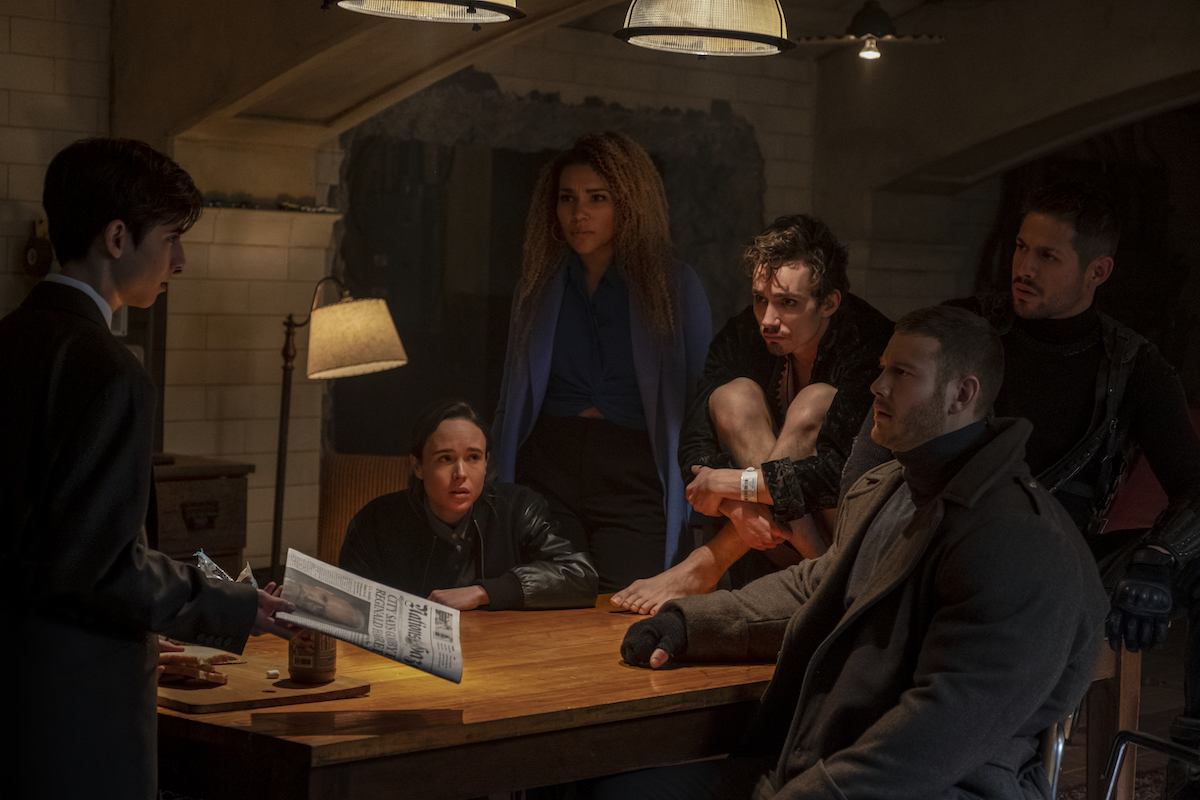
As far as we can tell so far, Ellen Page’s new project is unfortunately light on queer women and by “light” we mean “there aren’t any.” But, it’s not often we can see our lesbian girlfriend Ellen Page on the small screen so everybody tune in for that face.
Shadowhunters (Freeform) // February 25th // Season 3B
// watch the trailer //
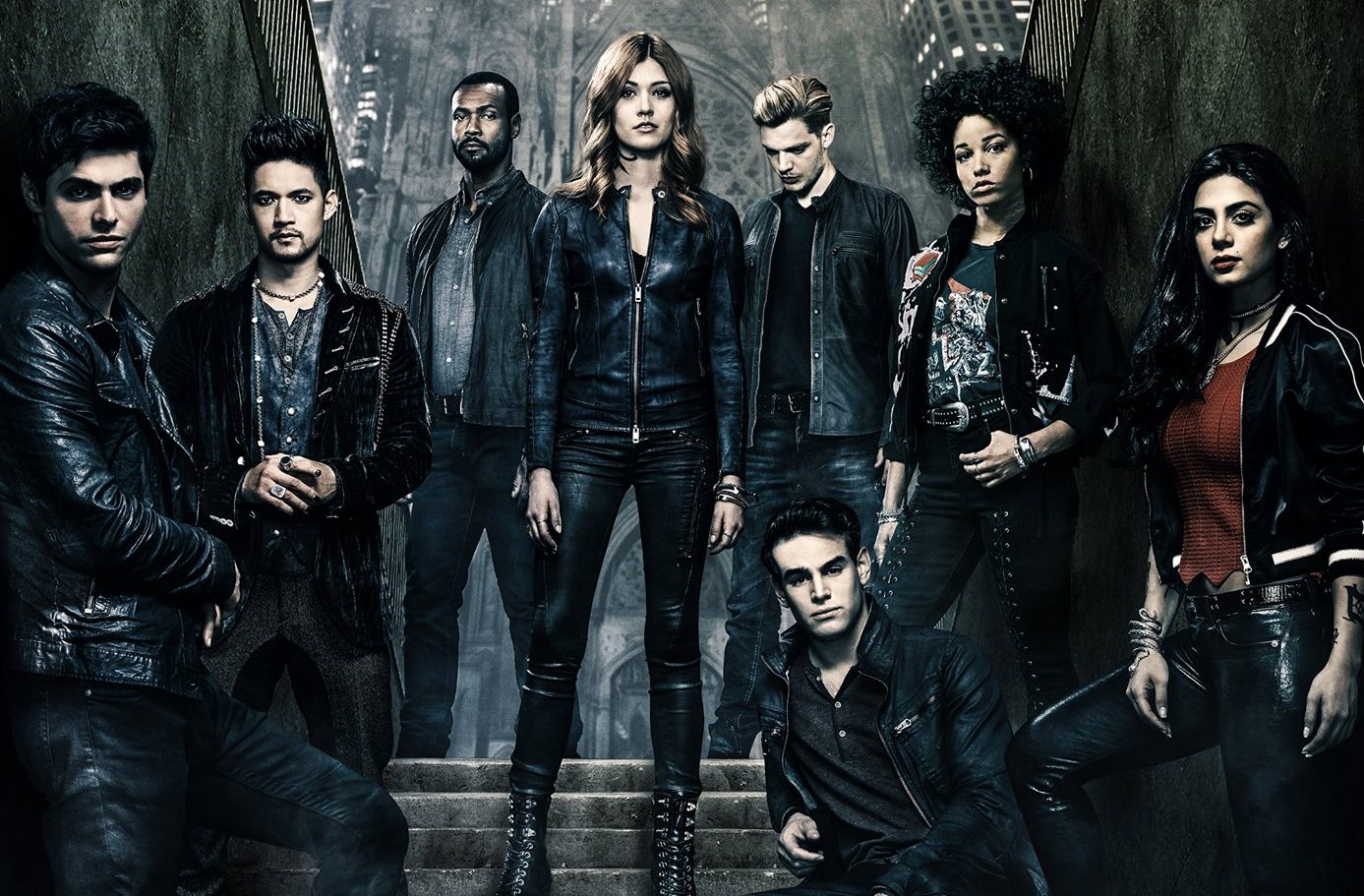
Shadowhunters will conclude its third season (which aired its first ten episodes from March – May 2018) this year with ten traditional episodes and a two-part finale. Harry Shum told Elle Magazine, “We were able to wrap the show up in a beautiful, exciting way. Filming those last few episodes was truly bittersweet.” However, it’s unclear if queer character Ollie will be returning, as she’s not listed on imdb for any 2019 appearances.
Better Things (FX) // February 28th // Season Three
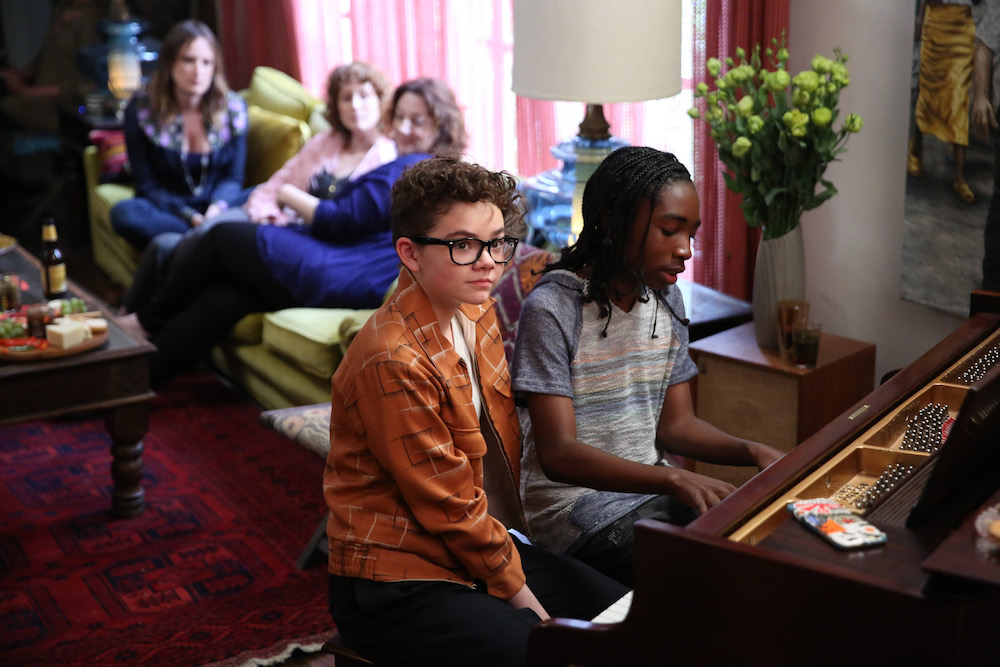
CR: Jessica Brooks/FX
Details are not in abundance for Pamela Adlon’s Louis-CK-Free Season Three of Better Things, which has a minor lesbian character and also one of Sam’s daughters might be a lesbian or could be non-binary or perhaps transgender, who’s to say! But we do know this: Sharon Stone (If These Walls Could Talk 2), Judy Reyes (Claws) and Janina Gavankar (The L Word) will all show up this year.
March
Station 19 (ABC) // March 7th // Season 2B
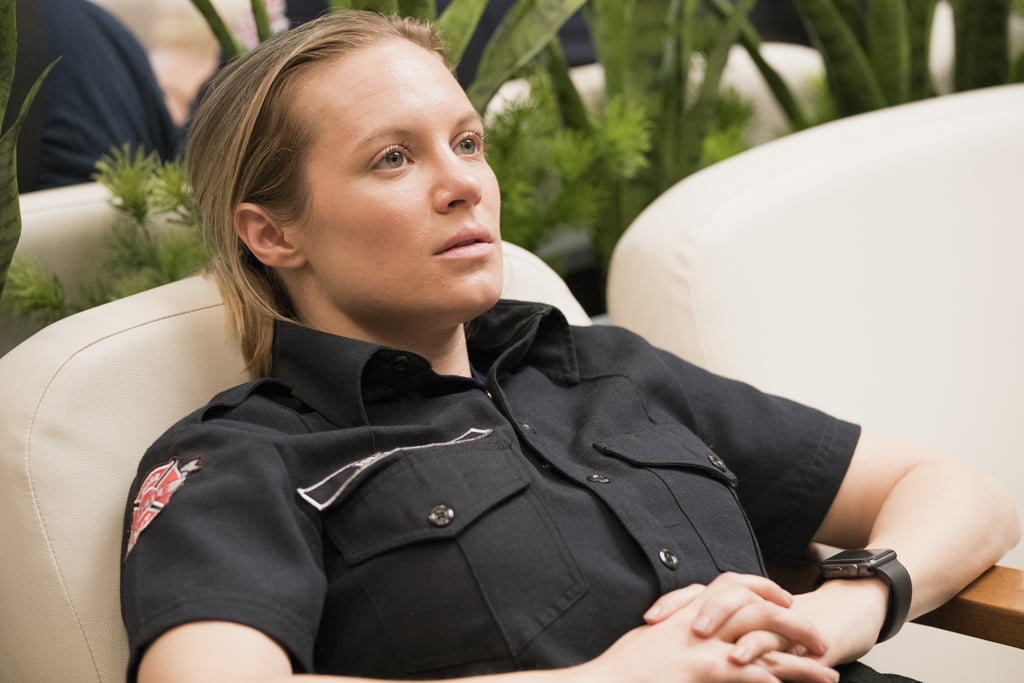
Station 19 will be back to see if the otherwordly attractive firefighters survive yet another peril and make it to yet another day. Most relevant to our interest will be finding out if Maya Bishop (who was recently promoted to Lieutenant by the Seattle FD! #20BiTeen in full effect!) decides to leave 19 for a leadership position at Station 23 instead. My gut tells me that she – no way Shondaland would want to deprive us of Maya’s kickass attitude any time soon. (- Carmen)
For the People (ABC) // March 7th // Season Two
// watch the trailer //
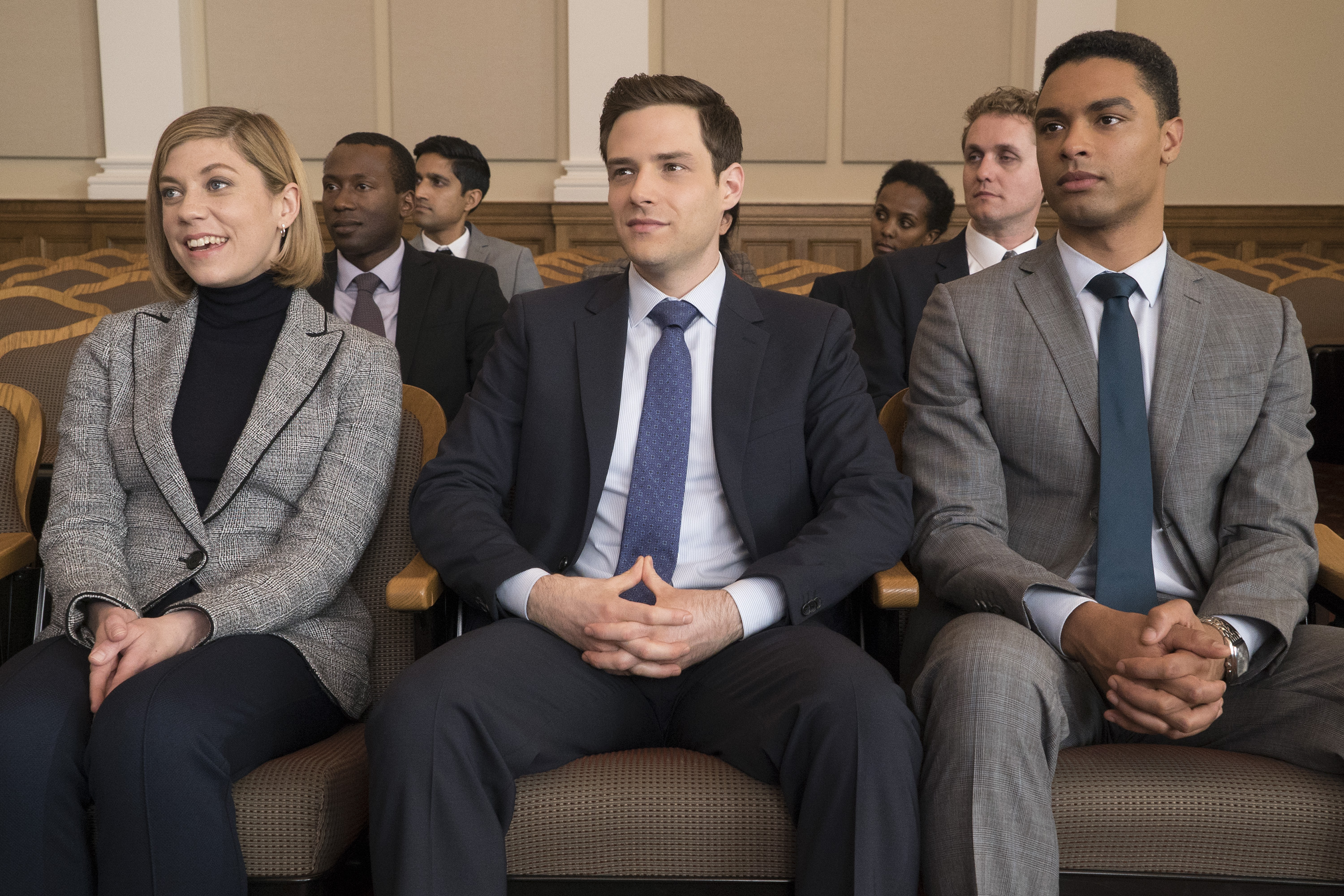
Season One Picture (ABC/Eric McCandless)
Think Grey’s Anatomy but with lawyers (and much, much drier). Two great reasons to watch: queer actress, Jasmin Savoy Brown, as public defender Allison Adams…she might not be gay on the show, but her relationship with her BFF, Sandra, is the gayest thing about For the People. Second, the actual queer character: Kate Littlejohn, the Paris Gellar-esque federal prosecutor, who hooked up with Anya Ooms (played by pansexual actress Caitlin Stasey) during season one. (-Natalie)
American Gods (Starz) // March 10th // Season Two
// watch the trailer //
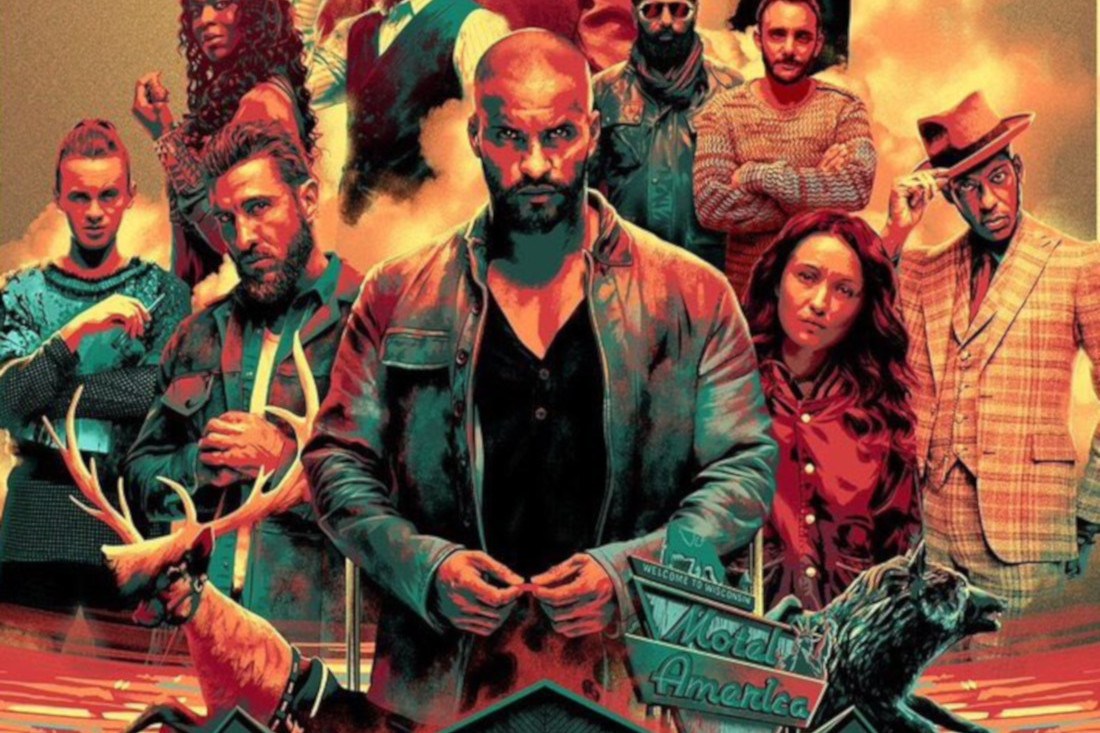
Native American actress Devery Jacobs joins the cast as queer Two-Spirit character Sam Black Crow and Yetide Badaki returns as the pansexual Bilquis when Season Two returns to find the battle in this Neil Gaiman adaptation “moving inexorably toward crisis point as the destinies of gods and men collide.” Bliquis will be absolutely “pivotal” to season Two and although Gillian Anderson is not returning as “Media,” South Korean actress Kahyun Kim is joining the cast as “New Media.”
The Good Fight (CBS All Access ) // March 14th // Season Three
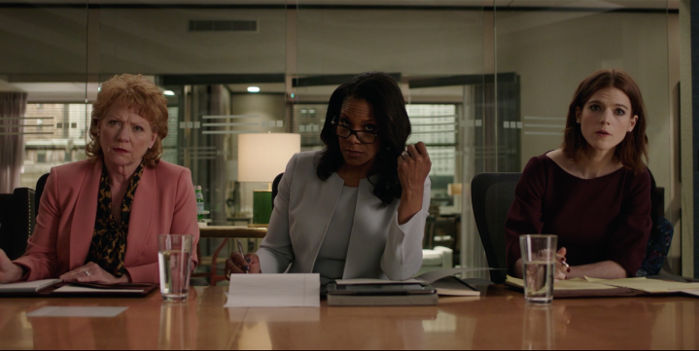
Season Two Picture
It’s worth it, the subscription, just for this fun and expertly crafted legal drama with a knockout cast that includes two primo Mommis, Christine Baranski and Audra McDonald. Listen: if you liked The Good Wife for any period of time, try this spinoff noted for its painfully resonant depiction of life under Trump in a way that somehow totally avoids being heavy-handed. Christine Baranski says Season Three will “focus a little more on the personal relationships and how living in the Trump age is affecting intimacy” and “address this big gender moment that we’re experiencing now with the #MeToo movement —how it’s affecting the workplace and the marriages and relationships and how men and women talk to each other.” Rose Leslie returns in a featured regular role as lesbian attorney Maia Rindell.
Shrill (Hulu) // March 15th // Season One
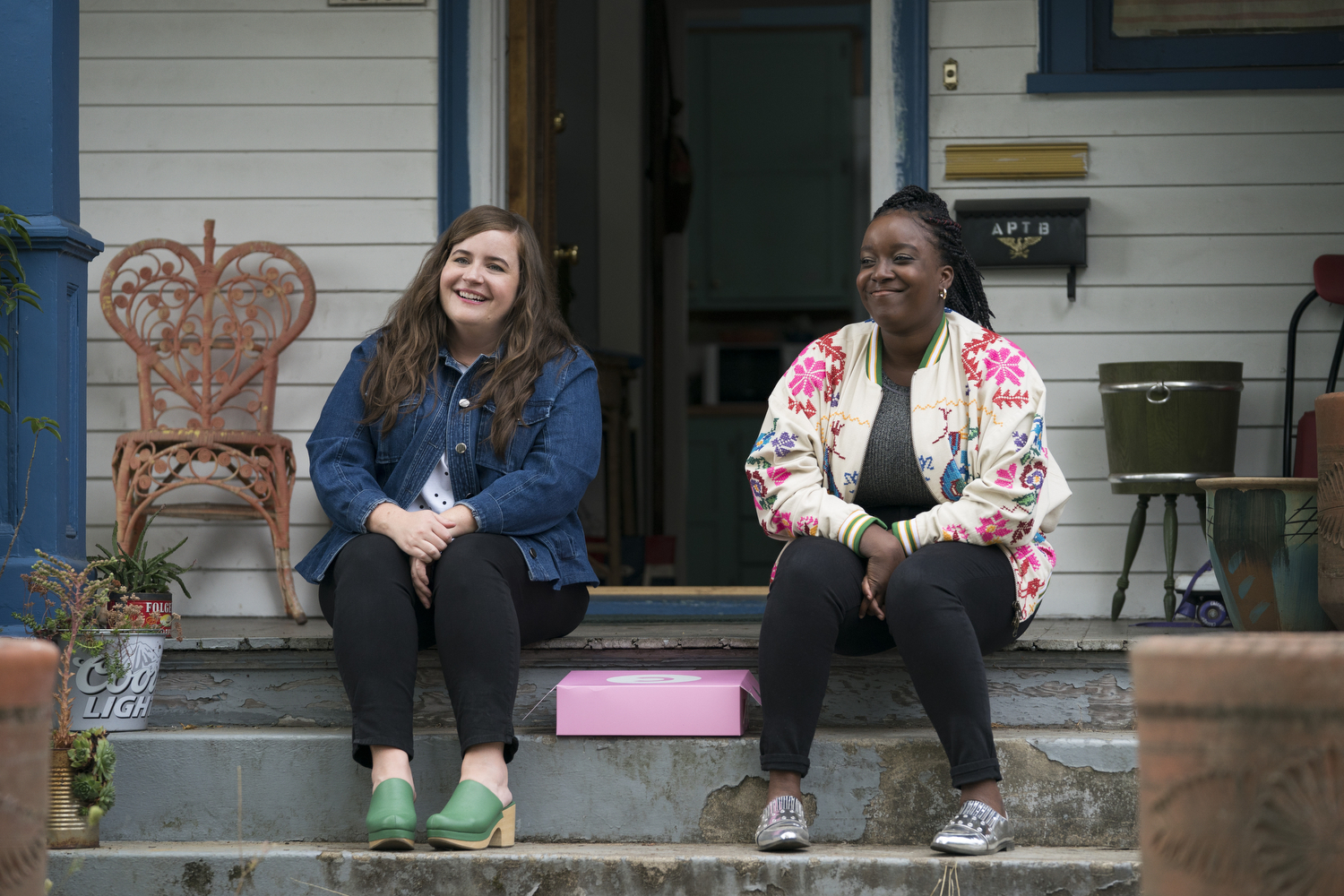
(Photo by: Allyson Riggs/Hulu)
This smart comedy series based on writer Lindy West’s memoir features Lolly Adefope as a black British lesbian hairdresser and the roommate of Annie, the show’s protagonist. You were probably going to watch this show anyhow but now you basically have to! Also John Cameron Mitchell is in it, so.
9-1-1 (Fox) // Season Two Returns March 18th
Jane the Virgin (The CW) // March 27th // Season Five
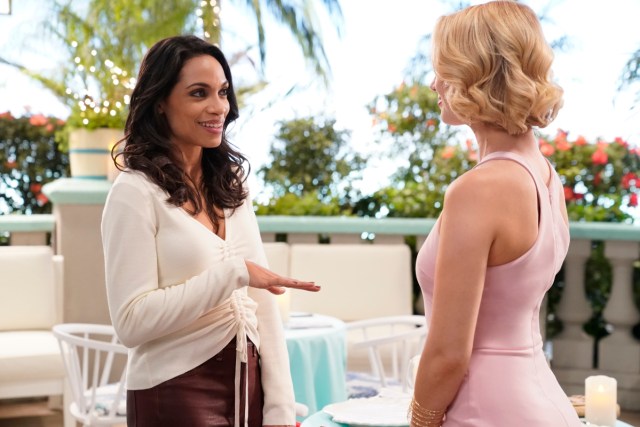
Jane The Virgin — “Chapter Seventy-Eight” — Image Number: JAV414b_0535.jpg — Pictured (L-R): Rosario Dawson as Jane Ramos and Yael Grobglas as Petra — Photo: Greg Gayne/The CW © 2018 The CW Network. All Rights Reserved.
Abby’s (NBC) // March 28th // NEW

Natalie Morales stars as Abby, an ex-military bisexual bartender who runs into trouble when her new landlord takes issue with the makeshift unlicensed bar she’s been running in her San Diego backyard.
Harlots (Hulu) // March 29th // Season Three

Veep (HBO // March 31st // Season Seven

April
Legends of Tomorrow (The CW) // April 1st // Season Four
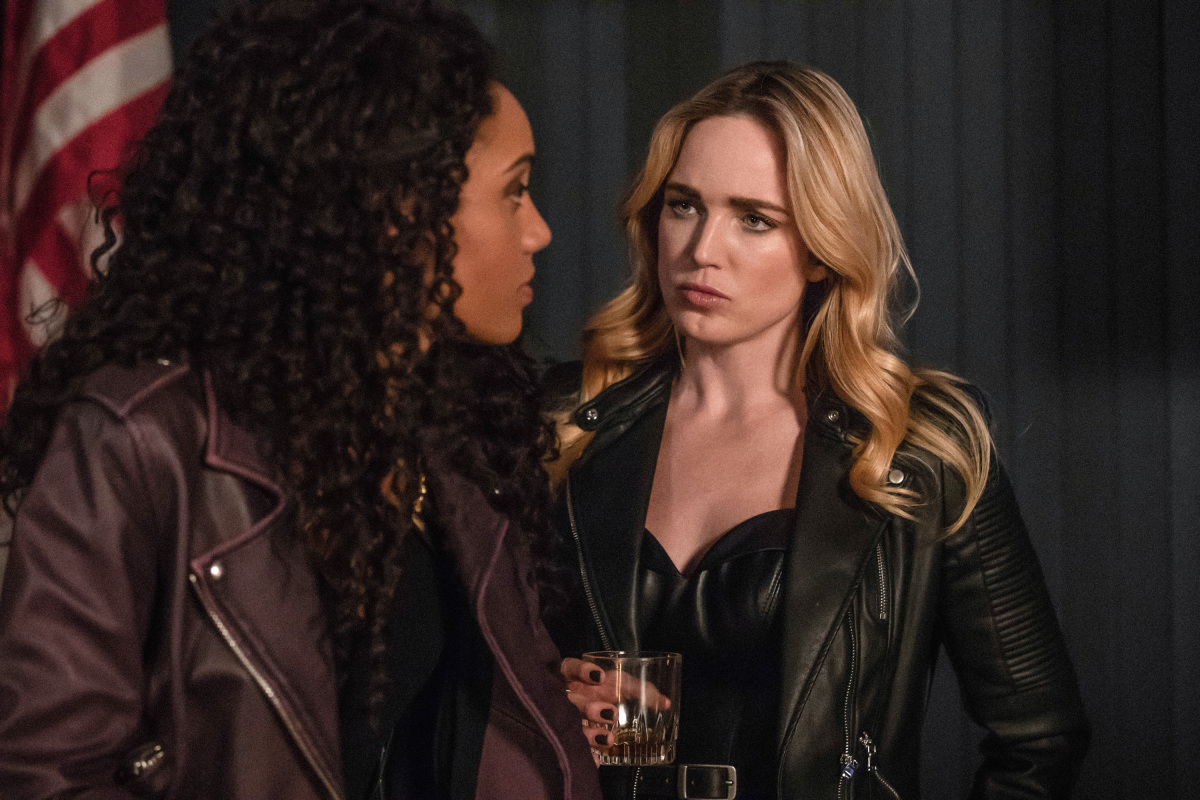
DC’s Legends of Tomorrow — “Legends of To-Meow-Meow” — Image Number: LGN408a_0257b.jpg — Pictured (L-R): Maisie Richardson-Sellers as Charlie and Caity Lotz as Sara Lance/White Canary — Photo: Jack Rowand/The CW — © 2018 The CW Network, LLC. All Rights Reserved.
The Chilling Adventures of Sabrina (Netflix) // April 5th // Season Two
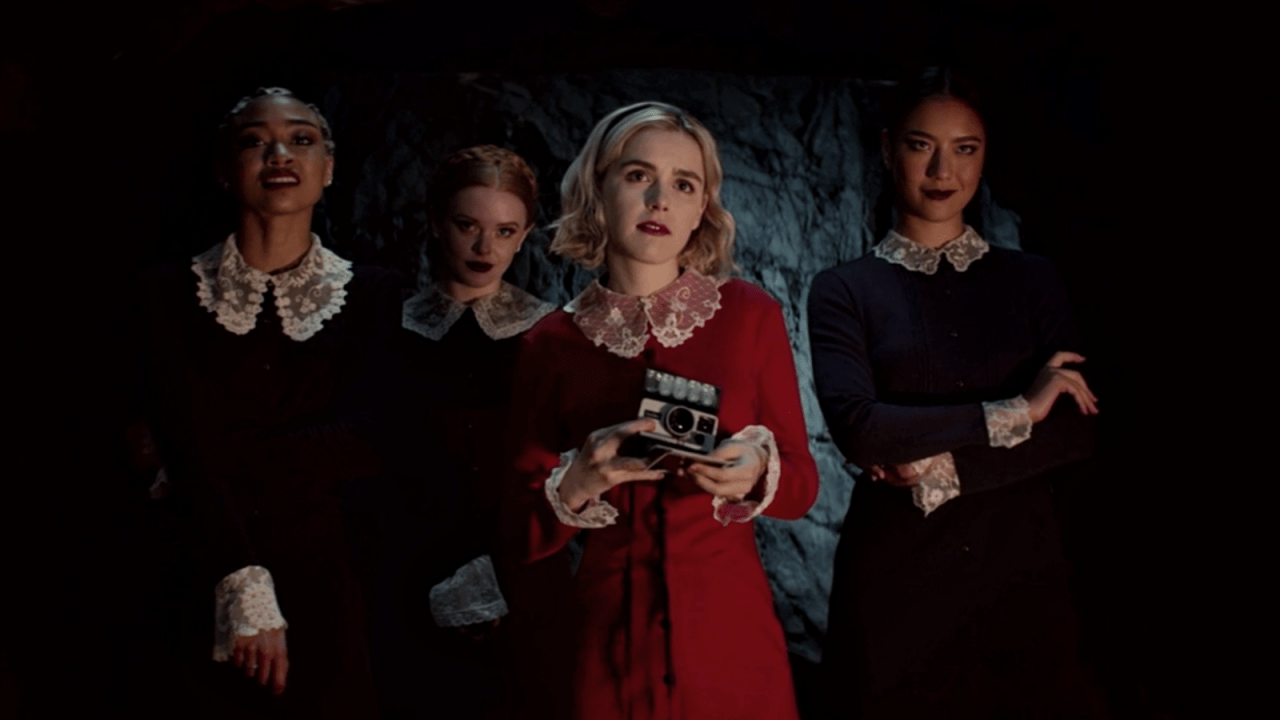
Killing Eve (BBC) // April 7th // Season Two
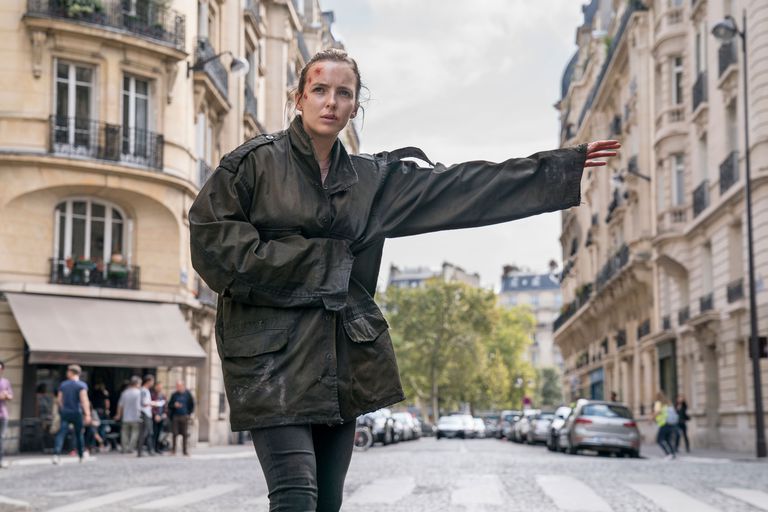
April isn’t really winter, but this is probably all you are going to think about all winter so we’re including it. The second series will pick up right where the first left off — M15 Officer Eve stabbed Villanelle, who managed to get away. The President of AMC Entertainment Networks has declared, “Killing Eve is picking up exactly 36 heart-thumping seconds after the events of the season finale. This new season is packed with superlative performances and is as twisty, subversive, darkly funny, nerve-wracking and pleasurable as our fans could desire.”
The Bold Type (Freeform) // April 9th // Season Three
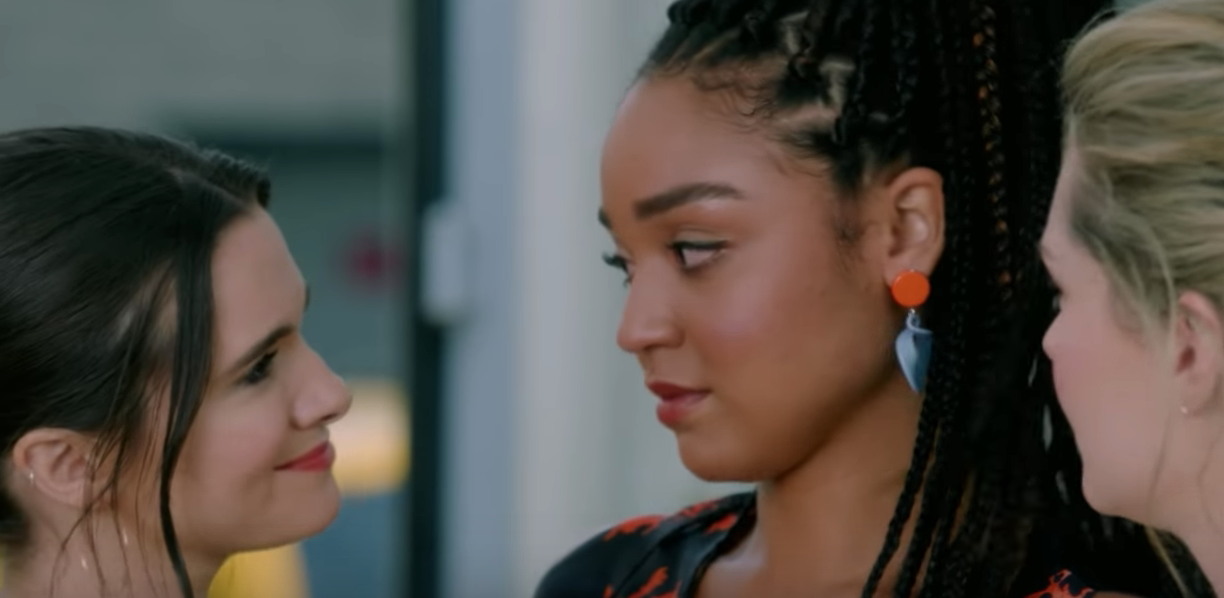
The Bold Type’s second season was a little bit all over the place, but we still hold this show in our hearts. Speaking of hearts, we can probably expect a very heartbroken Kat to return this spring. :-(
She-Ra and the Princesses of Power (Netflix) // April 26th // Season Two
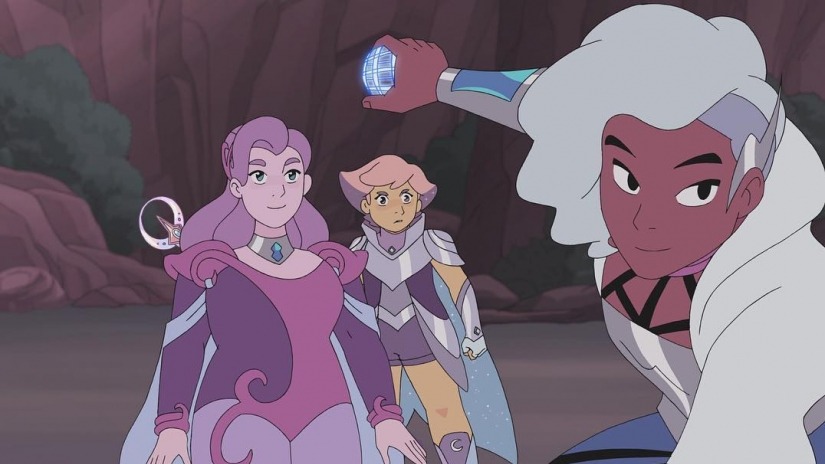
The 25 Best TV Shows Of 2018 With LGBT Women Characters
‘Tis the season for various media outlets to reveal their list of the 10-40 Best TV Shows of the year, and this year we decided to get in on that. With a caveat, of course — to us, no matter how critically acclaimed any given show is, we cannot personally crown it “the best” unless our specific interests (read: queer women) are included within it. I’m sorry that’s just who and how we are!
To prepare for this undertaking, I looked at 18 Best TV of 2018 lists across mainstream media, both high-brow and middle-brow: The Decider, The New York Times, Paste, Vulture, Vanity Fair, The Guardian, Entertainment Weekly, USA Today, The New Yorker, TV Guide, AFI, Complex, The AV Club, Verge, The AP, Variety, Slate, The Daily Beast and The Atlantic. On the list below, you’ll see in parentheses a number: that number represents the number of other Best-Of lists the show appeared on.
Last year I documented what felt like — finally— a shift wherein regular and recurring queer women characters were just as likely to show up at the forefront of prestige television as they were in our previous homes of “soapy teen dramas,” sci-fi/supernatural epics and very small parts in aforementioned prestige television. This year that trend has continued mightily. Three shows that turned up on pretty much every Best-Of list — The Good Place, Killing Eve and Pose — had queer or trans leads. Frequent inclusions on those Best-Of Lists that did not include queer women were exactly what you’d expect: The Americans, Homecoming, Atlanta, Better Call Saul, Lodge 49, Barry, Bojack Horseman (which did have one lesbian-themed episode but that didn’t feel like enough to warrant inclusion on this list, I’m sure you will @ me re: this) and Gianni Versace: American Crime Story. Most baffling to us all was that Lifetime’s You showed up on SEVEN Best-Of Lists, despite being insufferable and killing its only queer woman character. It’s not on this list.
This list is not, then, our favorite shows of the year, or the shows that brought us the most joy or the best representation. We’re doing a lot of lists this year about teevee, and most of them are our Favorites, not “The Best.” This list are the shows that have regular or recurring queer women characters and that I personally believe were, objectively, the best. The opinions of other critics weighed heavily into these rankings, and only in a few cases did I pick a show that wasn’t on any other Best-Of lists.
I look forward to witnessing your disagreements and agreements in the comments! Also I know there’s 27 shows here but 25 seemed like a better headline.
28. Marvel’s Runaways Seasons One & Two (0)
“Marvel’s Runaways” Hasn’t Achieved Its Full Gay Potential Yet, but It’s Already a Thrilling Ride
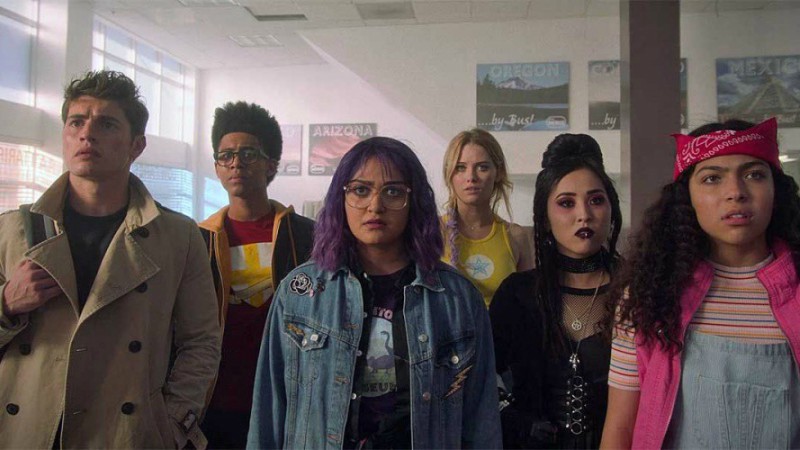
The timing couldn’t be better for this lovely comic book adaptation about a group of fierce, supernaturally talented teenagers challenging the abhorrent compromises their parents made, supposedly in their best interest, for a “better world,” at the expense of, you know — human lives, wealth inequality, and our planet. Plus, Virginia Gardner literally shines as Karolina Dean, a human-alien hybrid initially hiding her superpowers and her lesbianism ’til coming out near the end of Season One. Her revelation is refreshingly well received by her crush, cynical goth Nico Minoru, in what feels like a fairly honest depiction of Generation Y’s alleged tendency towards nonchalant sexual fluidity. Season Two sees the lesbian couple trying to make it work amid pretty challenging circumstances. Despite an enormous ensemble — six children and ten parents for each — Runaways has mostly succeeded in making each of them count. At times it fumbles, having bit off more than it can chew thematically and w/r/t sheer population, but it still manages to combine the easy joy of a teen drama with the satisfying anxiety of suspenseful sci-fi. — Riese Bernard
27. The Marvelous Mrs. Maisel Season Two (7)
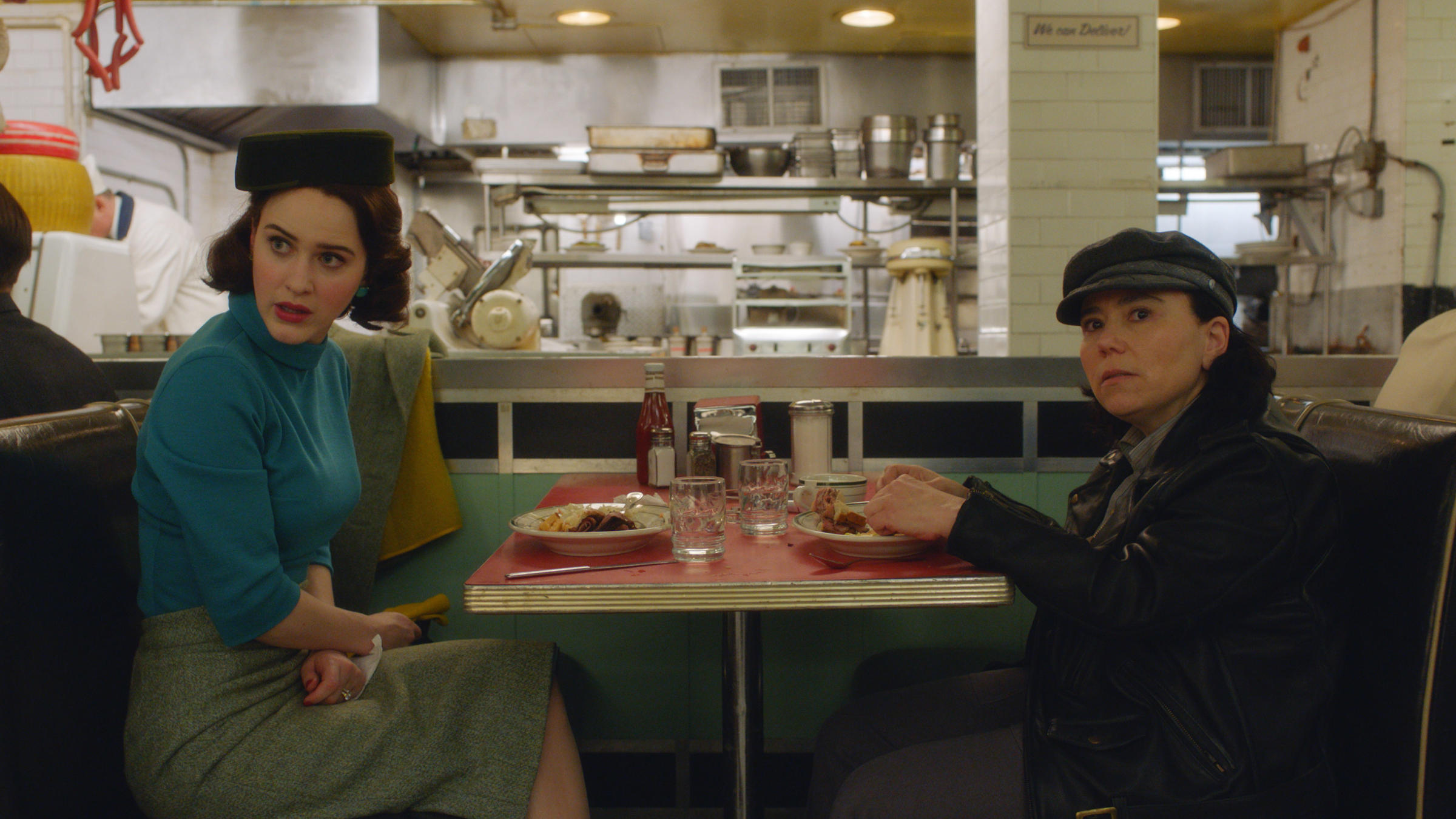
Undoubtedly the most cheerful show on the list and a bona-fide critical darling, The Marvelous Mrs. Maisel is hawkishly agreeable, floating through its second season on unmistakable charm, its trademark breakneck quip-laden dialogue, and a generous budget devoted to picturesque sets and locations that leave no affluent late-’50s stone unturned. Then there’s Mrs. Maisel herself, a plucky heroine who occasionally does wrong but when she does, it’s always very cute, and often laugh-out-loud funny. It’s frustrating that Susie’s lesbianism remains bafflingly unspoken, especially when Mrs. Maisel’s primary flaw continues to be its chronically low stakes, like a cake inside another cake inside another cake slathered in buttercream frosting. I do love cake, though! Regardless — Susie deserves a sexuality. I hope in Season Three she finally gets it. — Riese Bernard
26. Sally4Ever Season One (2)
HBO’s “Sally4Ever” Is Hilarious, Horrifying, Tries to Make Lesbian Toeing Happen
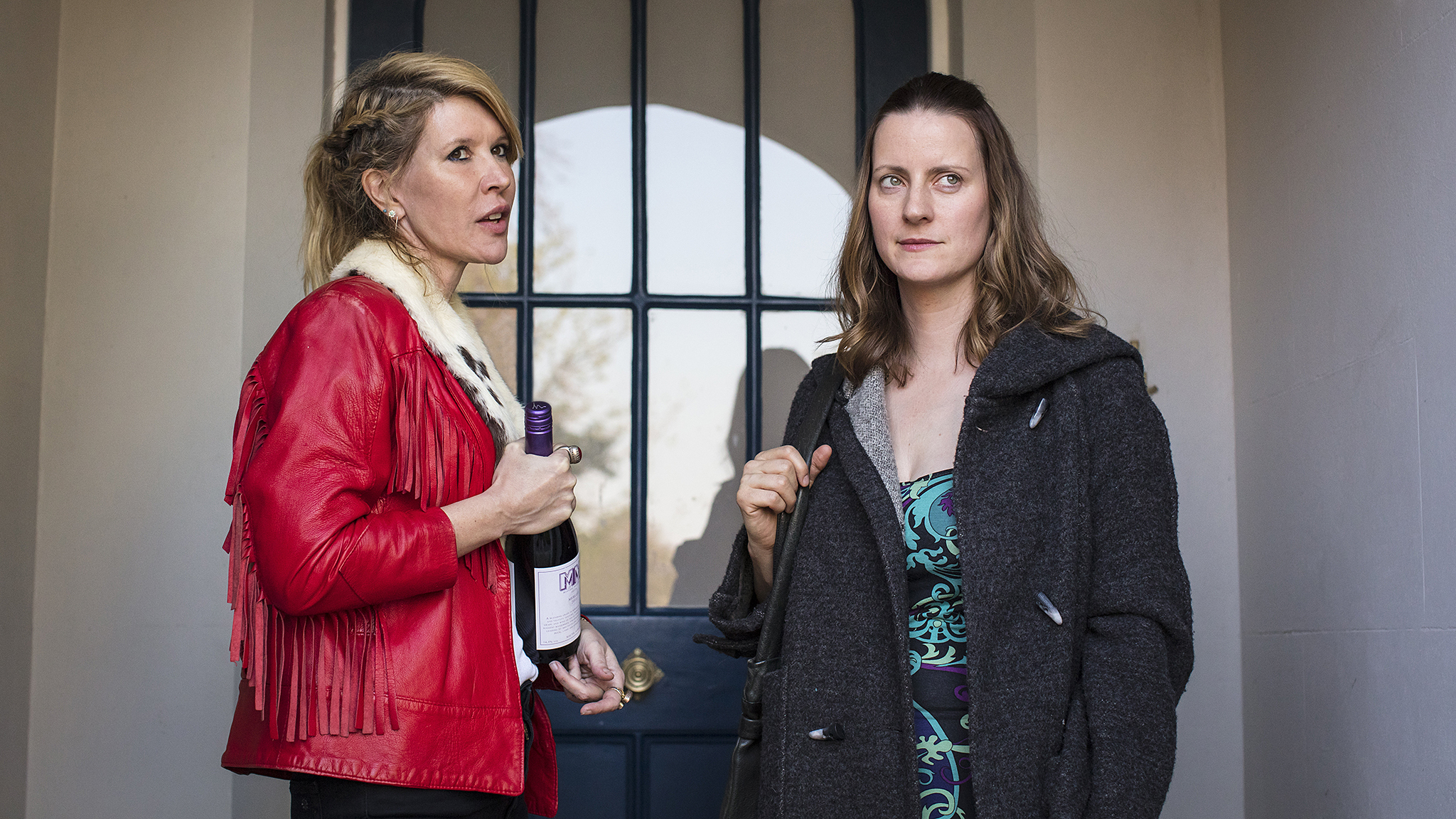
Earning points for sheer pugnacity, Sally4Ever, described by The Guardian as “a lurid lesbian sitcom,” is a disgusting, often offensive and downright bizarre comedy about an absurdly passive middle-aged woman, Sally, who leaves her droll underachieving partner for a wildly manipulative narcissistic lesbian musician / actress she first sees on the Underground. Julie Davis’s Emma is a madcap creation only Julie Davis’s mind could’ve created. Sally4Ever is one of four reminders on this list that you can always rely on British television to wallow in discomfort and failure in a way optimistic American TV is rarely willing to do. — Riese Bernard
25. Legends of Tomorrow Seasons Three & Four (2)
How “Legends of Tomorrow” Became One of the Best Queer Shows on TV
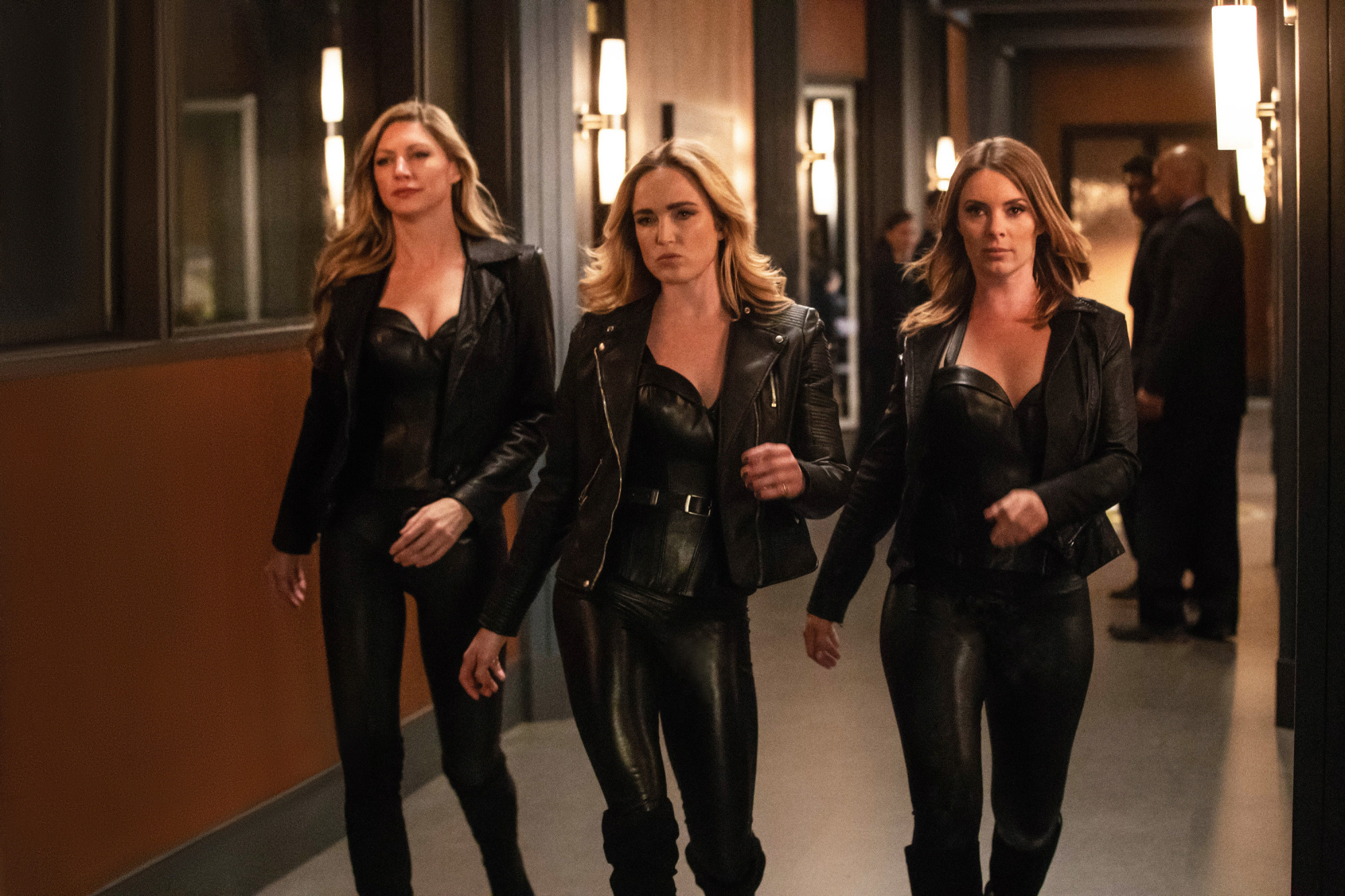
Legends of Tomorrow is one of the weirdest shows on television. With everything from Julius Caesar on the loose in Aruba to a stuffed animal worshipped as a god of war, you truly never know what’s going to happen next. On paper, it seems like the writers play mad libs with storylines, picking random nouns and locations out of hats and running with it. The most dramatic lines of dialogue are, simply put, absurd. But in 2018 this goofy-ass show has blossomed into something truly spectacular, as bisexual badass Sara Lance became, in the words of Zari, “not just the captain of the ship, but its soul.” It was still everything we love about the show – the misfit camaraderie, the wacky storylines, the outfits, the heart – but turned up to eleven. Sara also got her first post-Arrow longterm relationship with another woman. Their love story was fraught, sweet, sexy, complicated — and oh so rewarding. Best of all, it’s still going strong. — Valerie Anne
24. Everything Sucks! Season One (1)
Everything Sucks! is a Bangin’ TV Show With a Sweet Lesbian Lead
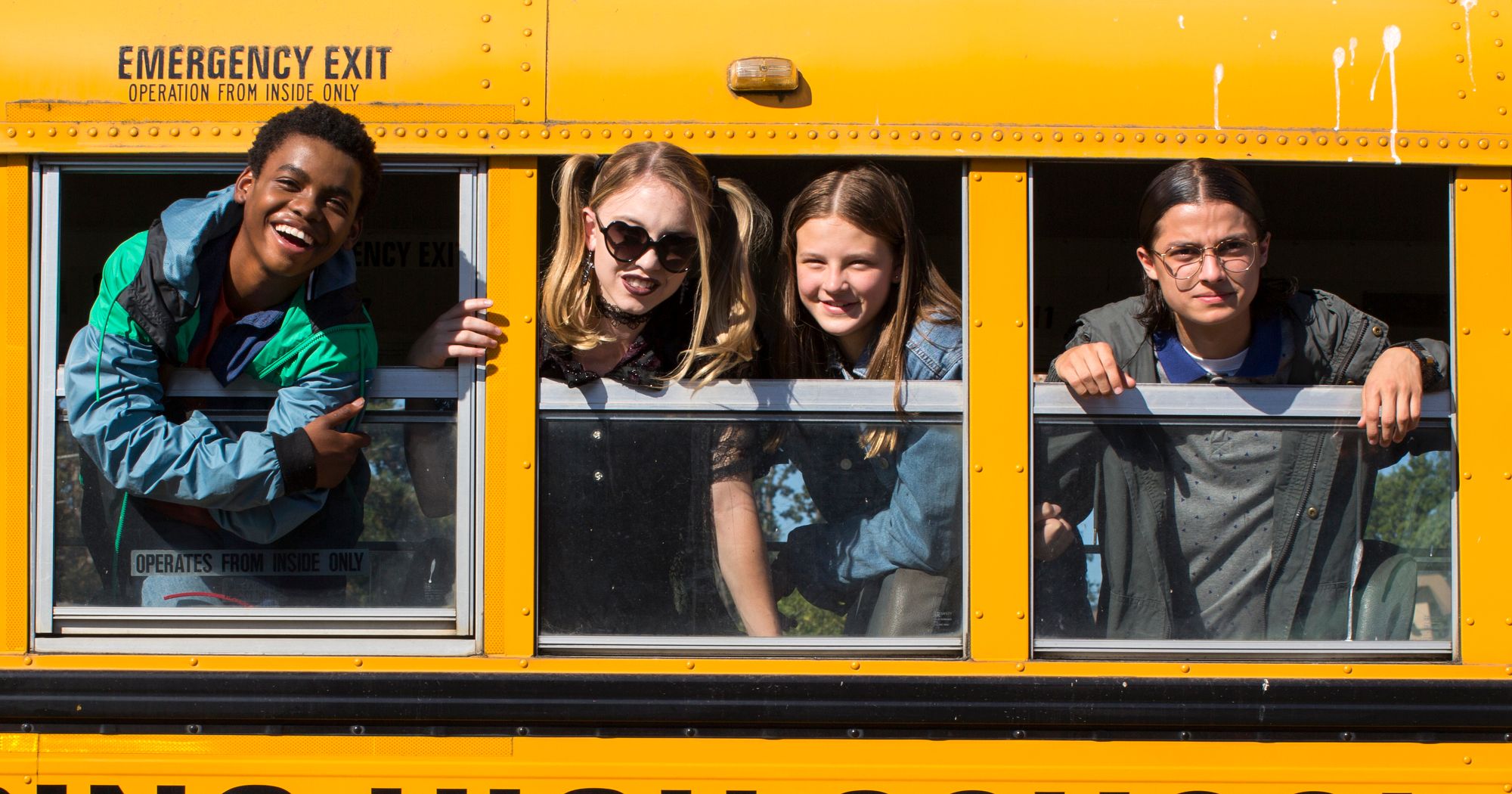
Sure, everything sucks, but something that specifically sucks is that this show only got one tiny season to breathe. Sweet and nostalgic, Everything Sucks! made the noteworthy choice of placing a lesbian character front and center of a tender coming-of-age dramedy set in Boring, Oregon. Amid pitch-perfect references to Frutopia, “Wonderwall” and the Columbia House Music Club, we have two girls on separate journeys towards queer revelations (and each other) and in this story, the pre-teen boys in their crew aren’t the main event. Considering all that, I suppose, perhaps it’s not so surprising it got cancelled.— Riese Bernard
23. Forever Season One (3)
Maya Rudolph’s Forever is Finally Here and Quietly Queer
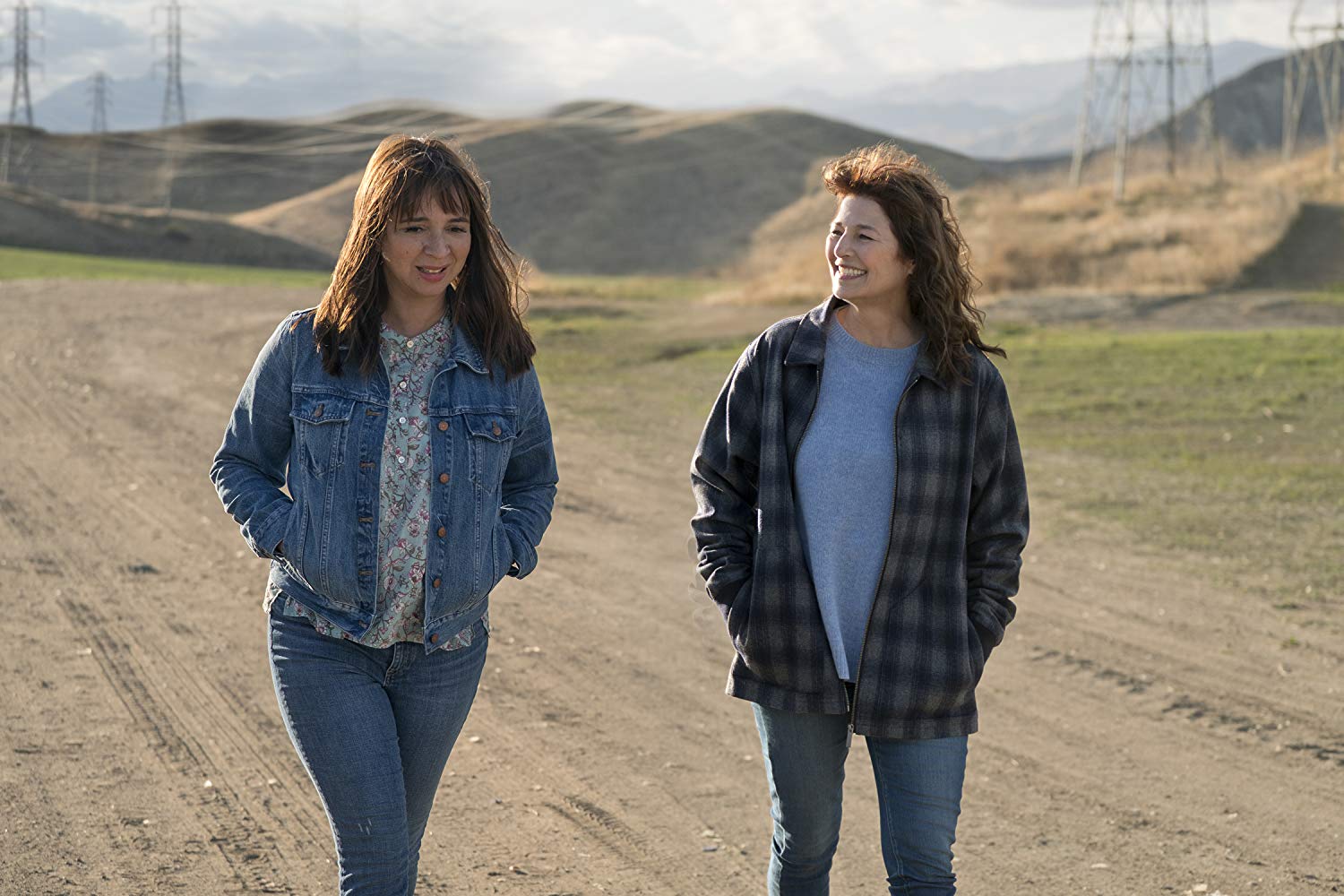
Every critic on earth adored Forever, partly because of the show’s unique and brilliantly executed concept, but mostly because of Maya Rudolph’s stunning and triumphant return to TV. What made Forever even rarer than those two things was the central conflict for Rudolph’s character, June, who experienced a middle-aged queer awakening at the hands of an enigmatic, furious, and sometimes even unlikable(!!) Kase, played by Catherine Keener. It does seem like maybe some vital character development for Kase was left on the cutting room floor in an effort to make sure the audience didn’t root too hard for her relationship with June — but what remained was still breathtaking and frankly revolutionary. — Heather Hogan
22. Counterpart Season One (3)
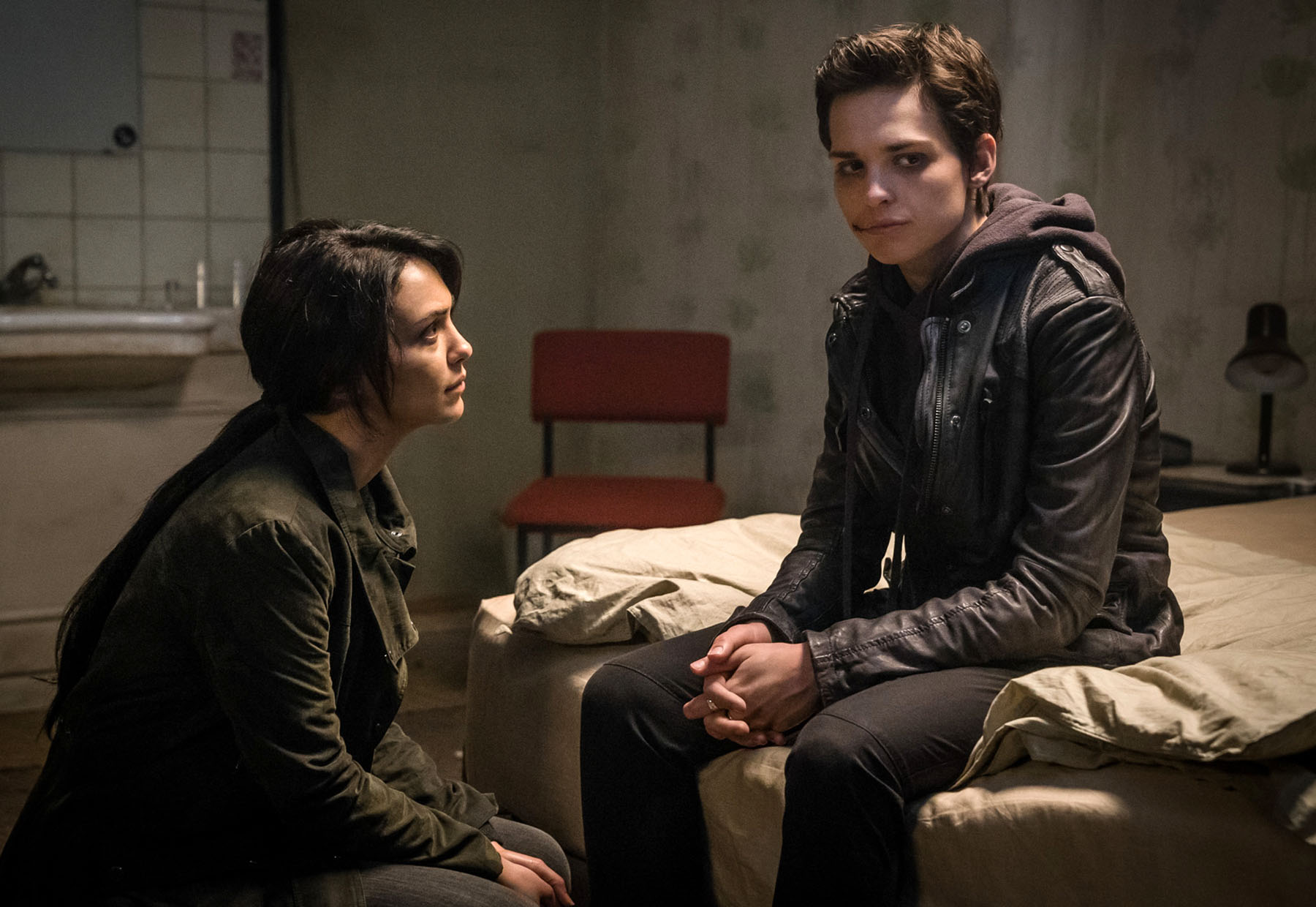
After years of lurking in the Showtime/HBO shadows, Starz has emerged over the past few years to, intentionally or not, feature queer women characters in nearly all of their original programming. And what original programming it has been! A lot of the well-deserved praise for this taut, suspenseful, dystopian spy thriller has gone to J.K. Simmons for his riveting performance as two versions of the same man, one in each of the show’s two parallel worlds. But the reason I tuned in was for one of the year’s few masculine-of-center lesbian regulars: Baldwin, a trained assassin never given the chance to develop a true emotional life or any dreams of her own, a fact laid bare when she’s forced to watch her counterpart, an accomplished classical violinist, die in an alternate dimension. She struggles with her sexual and emotional connection to a sleeper agent and an unexpected romance with a waitress, as brooding butches are wont to do, but we never struggle with our affection for this unique point of connection in a really good story.— Riese Bernard
21. Adventure Time Season 10 (1)
Princess Bubblegum and Marceline Smooch On-Screen, Live Happily Ever After in the “Adventure Time” Series Finale
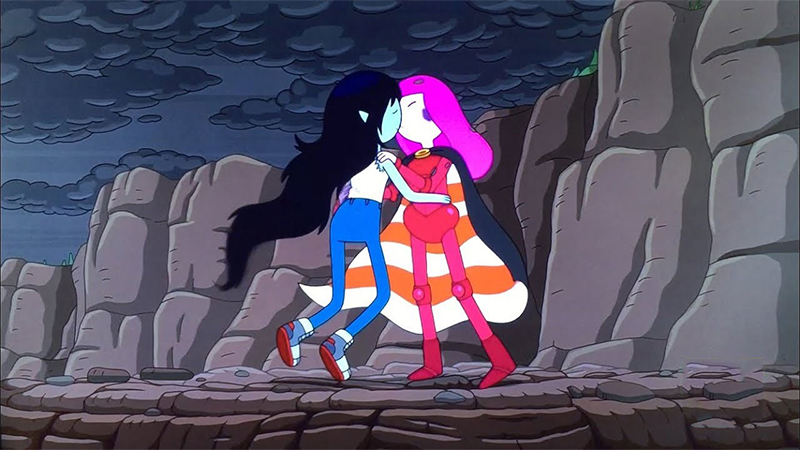
Adventure Time is easily the most influential show in Cartoon Network’s history; echoes of its style and themes reverberate far beyond kids TV. And really Adventure Time never was kids TV. Yeah, it was animated and as silly as bing bong ping pong. But as it evolved, it became as philosophical weighty and psychologically curious as Battlestar Galactica. Fans of Princess Bubblegum and Marceline enjoyed growing canonical support of their favorite couple over the seasons, both on-screen and in spin-off comic books — but they’d never actually confirmed their relationship physically until the series finale when Bonnie got womped in the dome piece and almost croaked and Marceline rushed to her and caressed her and professed her love and they smooched right on the mouths. — Heather Hogan
20. The Handmaid’s Tale Season Two (4)
“The Handmaid’s Tale” Season Two Gets Even Darker, Queerer, Curiouser and Curiouser
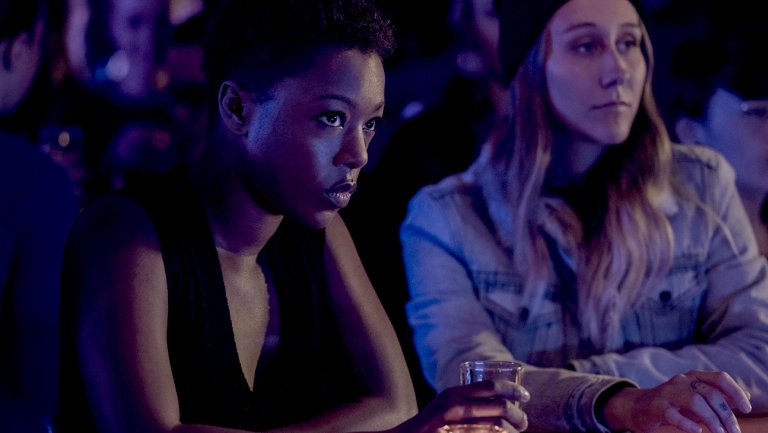
Season Two of Handmaid’s Tale was darker than Season One, which’s saying a lot. I mean we opened with a fake-out mass-hanging and before long Offred was basically slicing off a chunk of her own ear, then staring at the camera while we watched her bleed. And there would be so much more blood where that came from! But damn, the artistry of this brutal show and its magnificent cast, capable of communicating entire worlds without a single spoken line. The season’s most unspoken message, though, was this: pay attention. Look up. Don’t wait for them to come for you. Clea Duvall and Cherry Jones graced us with winning cameos and lesbian characters Moira (Samira Wiley) and Emily (Alexis Bledel) took greater prominence. So did Gilead’s persecution of lesbians in a specific dystopia designed by religious fundamentalists who are obsessed with traditional gender roles and able to rationalize their actions in the wake of a fertility crisis. It’s not a pleasant world to witness, yet it remains a seductive watch. Every moment of dark humor is hard-won, like, I suppose, freedom itself.— Riese Bernard
19. The End of the F*cking World Season One (5)
I Demand a Lesbian Cop-Show Spin-off of The End of the F*cking World
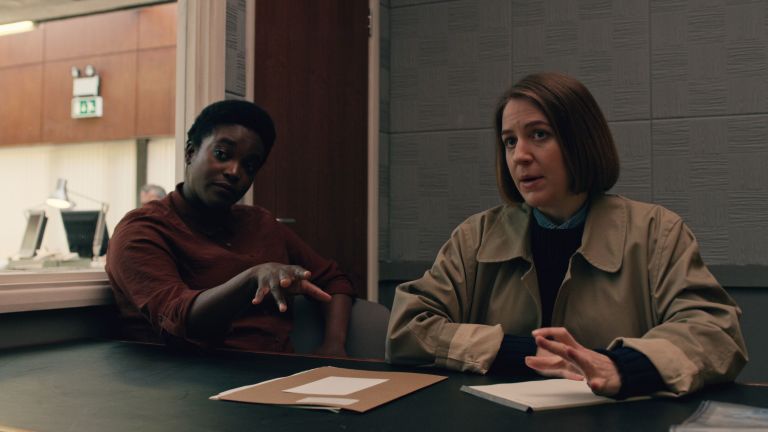
Sure, we could watch fresh-faced teen dreams fall in love in the lemon-scented hallways of suburban California high schools, or we could watch … whatever this was? A 17-year-old self-diagnosed psychopath who loves knives goes on a traveling caper with the only girl in town who’s sad, alienated and nihilistic enough to wanna run away with him. Hot on their tail are two lesbian detectives who had a thing once and definitely deserve their own show. — Riese Bernard
18. Dear White People Season Two (4)
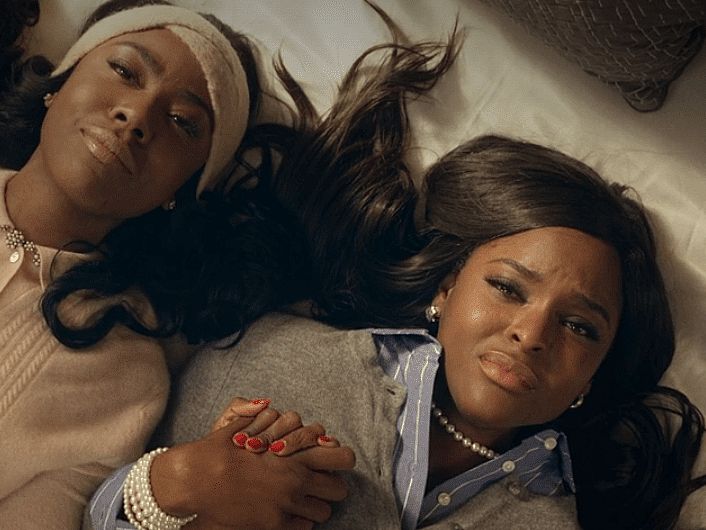
In this current television landscape, binges come and go. A television show drops on streaming, you watch it, maybe even obsess for a spell, and then it fades to the recesses of your memory to make room for whatever trendy new show is coming next. In those dips and waves, sometimes something really special falls through the cracks. I say that because there’s a chance that you didn’t watch Dear White People last year and that’s a mistake.
The first season of Dear White People was regrettably uneven, particularly in regards to its lesbian representation, but the second season aired this year and came back stronger, more focused, and razor-sharp! It’s a stylized and poignant exploration of being a black student at a predominantly white university that is as smart (if not smarter) than almost any other comedy I watched last year. The weekend of its drop, I finished all 13 episodes in two days. The next weekend, I watched it again. I couldn’t shake how insightful it was, how bright, how one-of-a-kind. You can watch the second season with no knowledge of the first and follow along easily. As a bonus, it comes with the bittersweet gift of two smaller, but significantly better executed black lesbian plots. One of those plots stars Lena Waithe. It also features Tessa Thompson as a parodied take on a Stacey Dash’s “black republican television pundit” figure. Her character plays out over a series of cameos, but as far as I’m concerned her final scene is worth the entire season by itself. — Carmen Phillips
17. Steven Universe Season Five (2)
“Steven Universe” Makes History, Mends Hearts in a Perfect Lesbian Wedding Episode
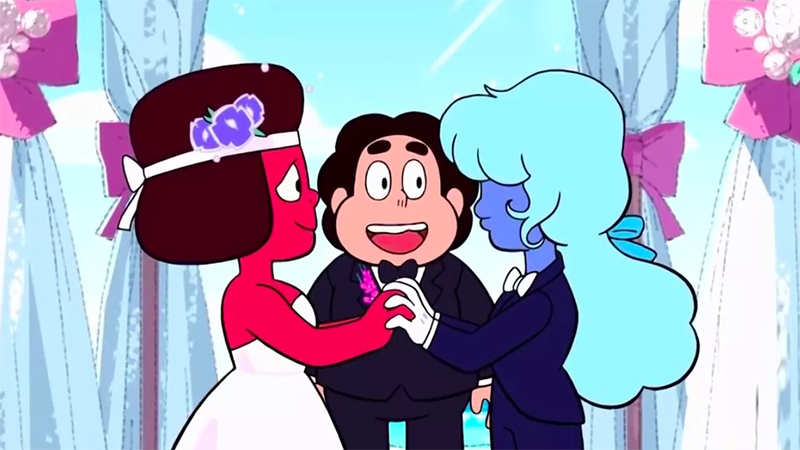
Steven Universe continues to explore more adult themes more fully than nearly every non-animated show on TV: family, grief, depression, commitment, betrayal, duplicitousness, forgiveness, puberty, gender, gender presentation, sexuality — and it does so in a way that’s warm and engaging and funny and, most of all, hopeful. This season, Rebecca Sugar’s beloved non-binary lesbian gems, Ruby and Sapphire, broke more ground by becoming the first same-sex couple to get married on all-ages TV. Their wedding featured masc gems in dresses, femme gems in tuxes, kisses right on the mouth, and swoon-worthy proclamations of eternal love. Also, of course, ass-kicking. Steven Universe remains one of the best shows on television, full stop. — Heather Hogan
16. Black Lightning Seasons One & Two (0)
Recaps of Season One & Two of Black Lightning
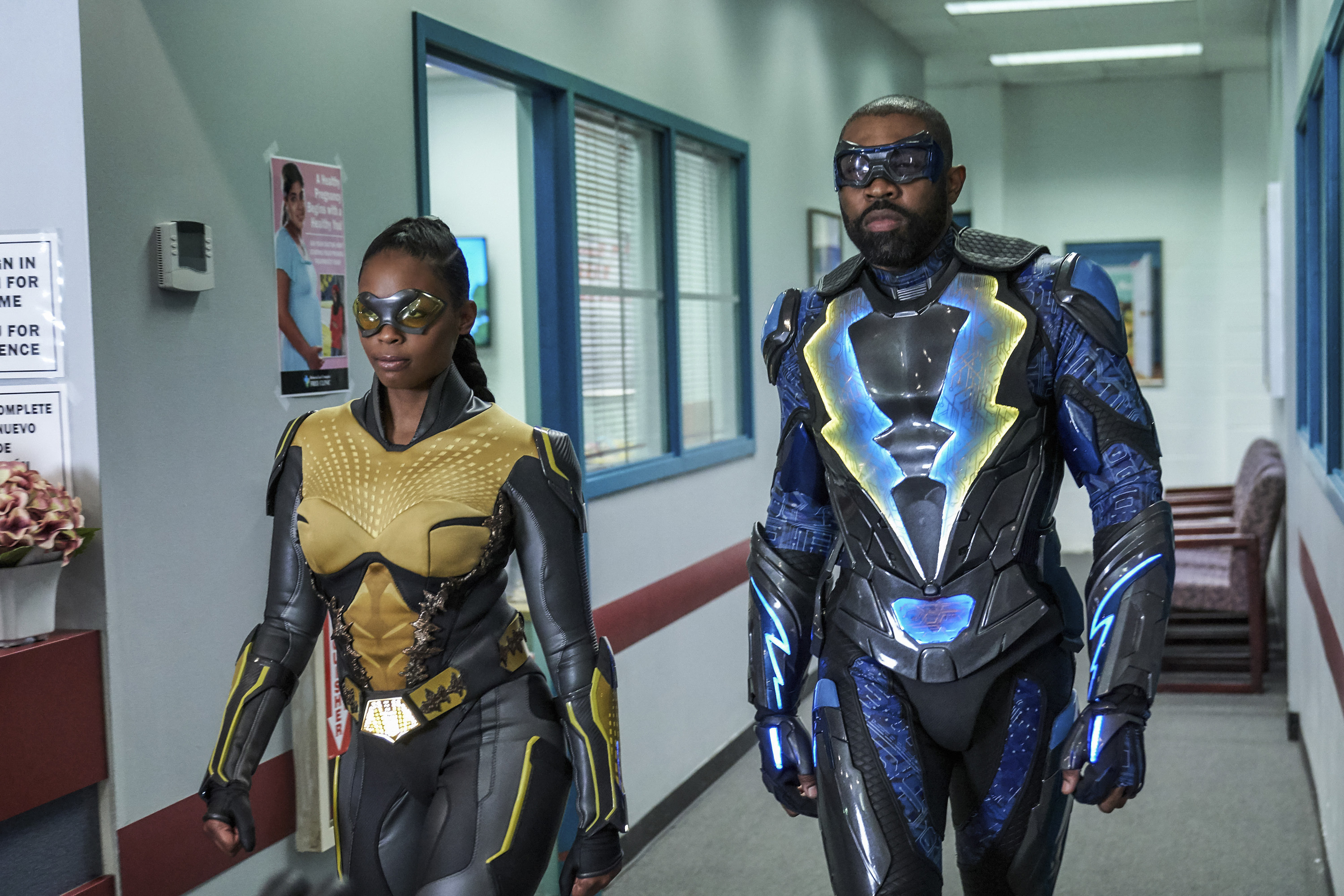
The CW has delivered a very entertaining batch of fresh-faced white superheroes determined to battle off some wacky Big Bads, but Black Lightning really elevates the genre and takes notable risks. The story is rooted halfway in this world, too, spotlighting a family wrought together over love and a deep commitment to their community and social justice, while divided on how best to manifest that commitment. Annissa Pierce, aka Thunder, became network television’s first out lesbian superhero when she debuted in early 2018. “I’ve said before that bullet proof black people is my favorite superhero trope,” Carmen wrote in a Season One recap, “but there is also something so sweet about a television lesbian who can’t be shot.” We hope to see more in future episodes of her girlfriend Grace, played by Chantal Thuy. Don’t sleep on Black Lightning. Wherever it’s going, you’ll want to be on board.— Riese Bernard
15. The Bisexual Season One (2)
Hulu’s “The Bisexual” Is Here to Make Every Queer a Little Uncomfortable
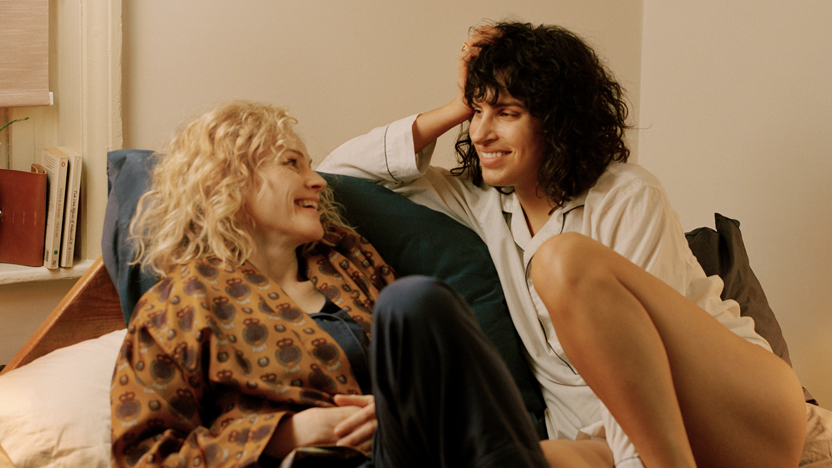
This has been such a great year for queer weirdos with their fingers acutely upon their own pulses. In between impeccable L Word references and fetching fashion choices, The Bisexual is an uncompromising journey of sexual discovery, jump-started when Leila breaks up with her much older girlfriend (and business partner) Sadie. Akhvan’s world feels undeniably authentic — she points out that “it’s the only show on TV where you can watch two Middle Eastern women in a car, talking, taking up the screen with their different bodies and different ethnicities.” Fumbling and unafraid of its own potential, The Bisexual also portrays a multi-generational, diverse network of queer and often gender-non-conforming women in London’s East End in all its messy, self-reflexive glory. — Riese Bernard
13. The Good Fight Season Two (9)
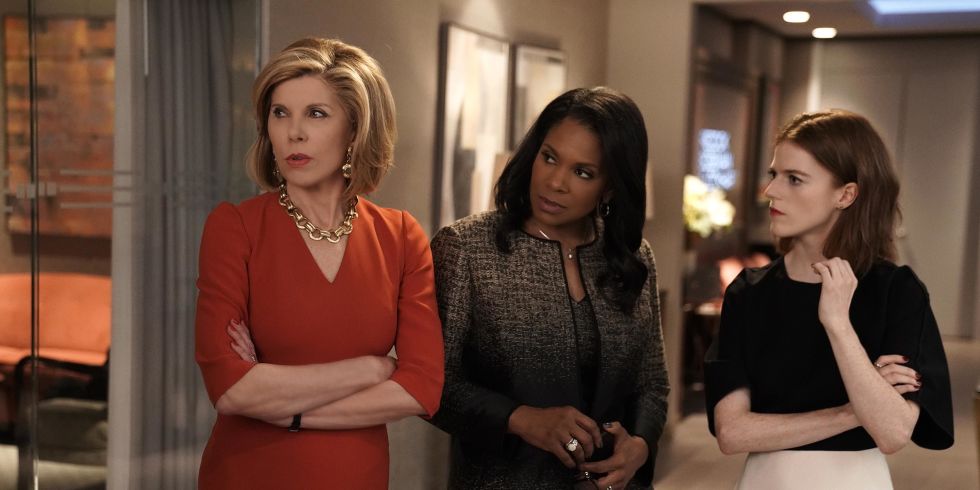
The Good Fight lives in that very special sweet spot that I like to call organized chaos, almost ballet-like in its sweeping rhythm. It is very much a playground for Christine Baranski and Cush Jumbo to do their impeccable work. But it also, better than any other show, captures the collective meltdown that has become a ceaseless hum in Tr*mp’s America. It’s sharp, and it’s dark, and it’s still funny and fun, with a very women-driven, diverse cast. And one of its central lawyers, Maia Rindell (Rose Leslie), also happens to be a petite lesbian mired in staggering lesbian drama, and by lesbian drama I mean her girlfriend literally testifies against her in a massive court case that Maia’s parents have her swept up in! Also, in season two we learn that Maia was in love with her tennis instructor as a closeted baby gay, and I have never felt more Seen. — Kayla Kumari
12. Harlots Season Two (0)
Harlots Season Two Is Here, Queer and Transcendent
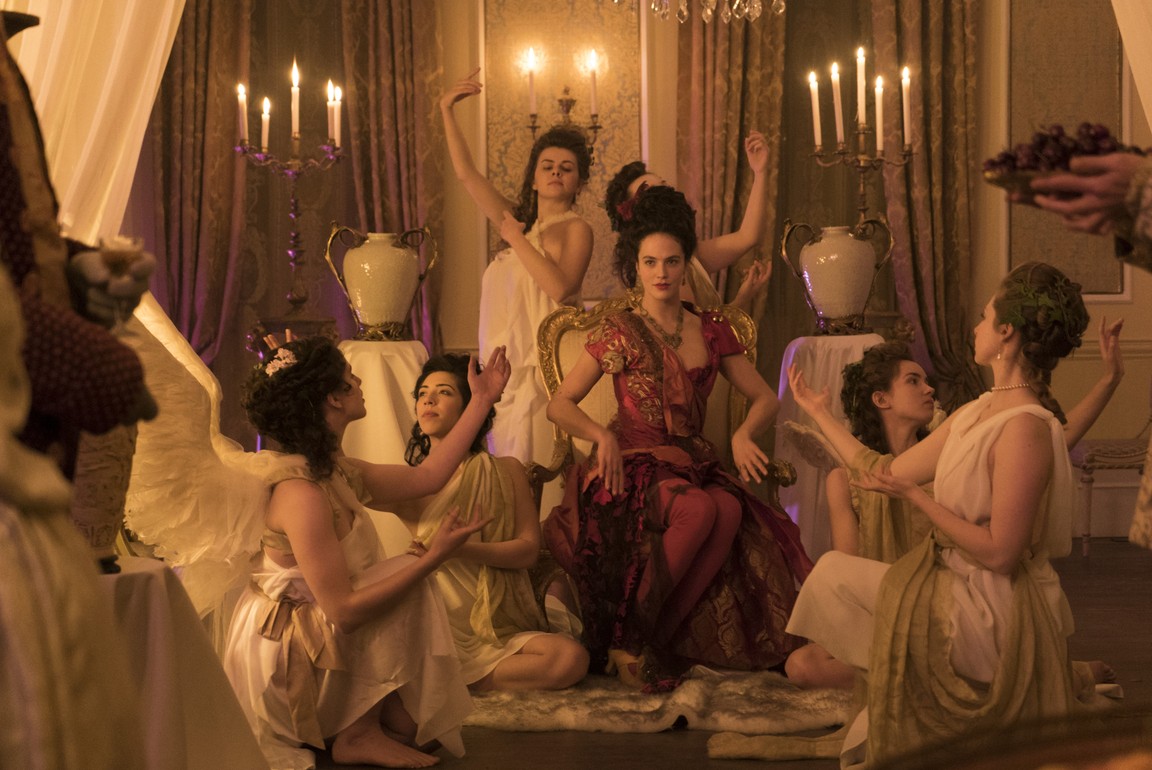
Harlots might be the year’s most underrated show (Seriously, how does this show earn a nearly perfect score on Rotten Tomatoes but not make it onto anybody’s Best Shows Of the Year list? I endeavor to suggest that the reason is Men). I declared Harlots the most accurate portrayal of indoor-market sex work ever represented onscreen in Season One — surprisingly more resonant to me as a former sex worker than any contemporary portrayals — and its extra queering in Season Two made it moreso and then some. If Season One was about sex work, Season Two is about the reality that what’s done to sex workers is inextricable from what’s done to all women — the lessons about power, violence, solidarity and struggle in stories about sex work are ones that the larger conversation about gender ignores at its peril. — Riese Bernard
11. High Maintenance Season Two (6)
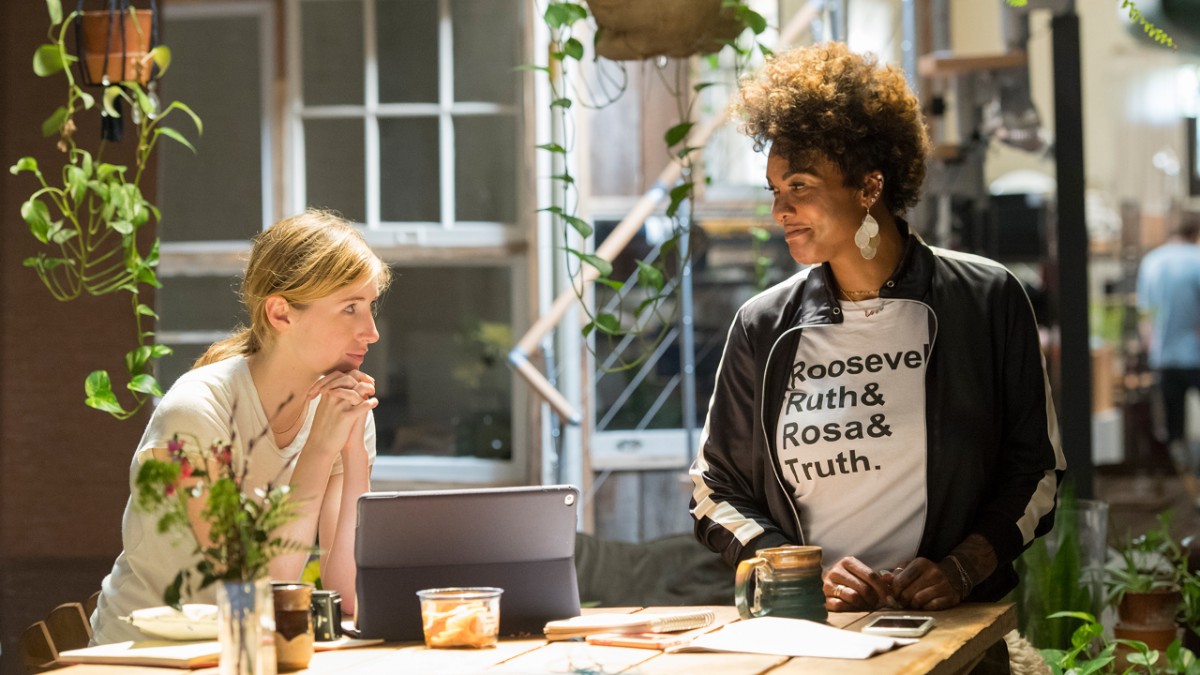
In between High Maintenance‘s first and second season, a lot happened for husband-and-wife co-creators Ben Sinclair and Katja Blichfeld — including Katja coming out as gay, thus ending their marriage. Although the split hadn’t been finalized at the time, Season One ended with the reveal that Sinclair’s “The Guy” marijuana-delivery character lived down the hallway from his ex-wife, who’d left him for another woman. Its Season Two, then, is a long time coming and imbued with a rapturous affection for contemporary queer culture. The characters calling upon “The Guy” negotiate languid lesbian sexual dynamics, LGBT-affirming churches, sexually fluid teens and anti-Trump feminist gatherings attended by well-intentioned, hysterical liberals. Particularly touching was a bittersweet episode that saw “The Guy” visited in the hospital by aforementioned now-lesbian ex-wife. But honestly, with few exceptions every story in this scene is like a nice hybrid edible that makes you giggle, relax, and occasionally feel profound.— Riese Bernard
10. Vida Season One (2)
“Vida” Review: Starz’s New Latinx Drama Is Sexy, Soulful and Super Queer
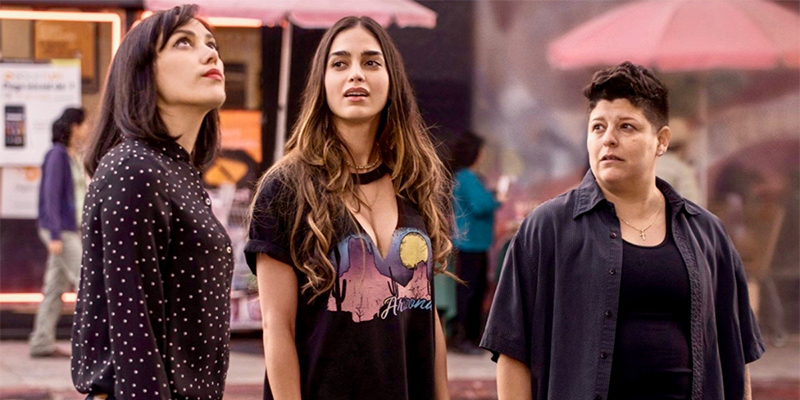
Tragically overlooked by mainstream critics, one of 2018’s most innovatory offerings sees emotionally estranged sisters, bisexual attorney Emma (Michel Prada) and Lyn (Melissa Barrera), reuniting in their home of Boyle Heights after the death of their mother who, it turns out, was in fact dating her butch lesbian “roommate,” Eddy. Showrunner Tanya Saracho’s writing team is entirely Latinx and mostly queer, and they deftly address the complications of “gente-fication” and the joys of living breathing loving community with all the nuance and authenticity it requires. But perhaps most notable for all of us here was the graphic butch/femme sex scene that opened Episode Three. “It isn’t just about the hot sex — though the sex is very hot — it’s about creating spaces where Latinx queer bodies can feel ownership,” wrote Carmen in her recap. “It’s tearing down shame. It’s about saying that our love, our sex, our sticky sweat is valid.”— Riese Bernard
9. Crazy Ex-Girlfriend Seasons 4 & 5 (4)
“Crazy Ex-Girlfriend” Is Singing Our Song: Valencia Has a Girlfriend!
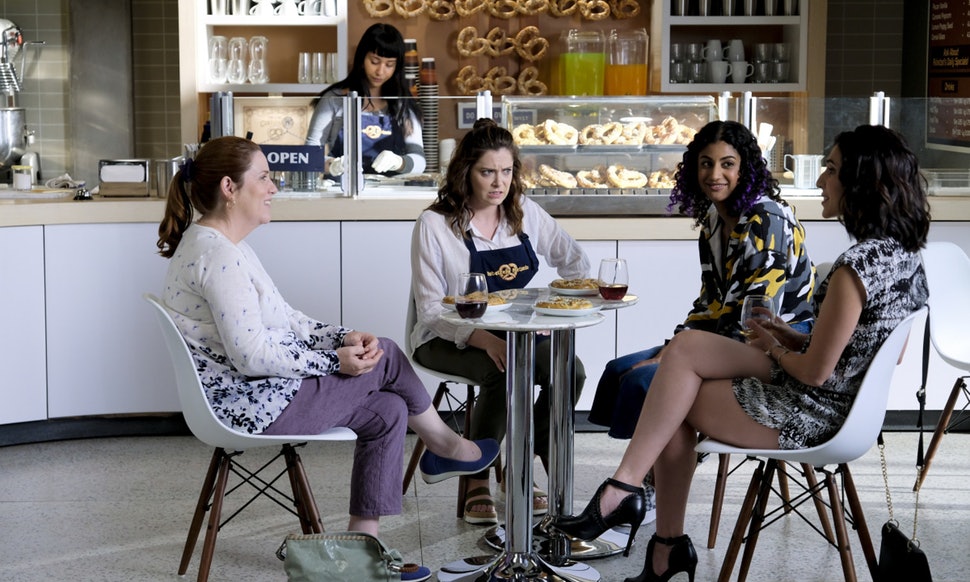
Maybe we should’ve seen it coming — after all, soon after we meet Valencia for the first time, she’s kissing Rebecca on the dance floor and lamenting the fact that everyone wants to have sex with her — but it wasn’t until Valencia met Beth that we got to see her bisexuality as something other than comedic fodder. Crazy Ex-Girlfriend has always been a queer-friendly show but with Valencia and Beth, it finally put lady-loving ladies on centerstage. Valencia’s bisexuality was the pitch perfect end to a show-long character arc: she’s evolved from the vain yoga instructor who couldn’t build meaning relationships with women to loving, working and living with one.
The Golden Globe-winning series is currently in its fourth and final season and Valencia and Beth are still together, happy and, in an unusual twist for Crazy Ex-Girlfriend, relatively normal (unless you count the $8000 they pay in rent for their new closet size NYC apartment). We feared that the couple’s recent relocation meant that we wouldn’t get to see as much of them but the show’s found a way to bridge the distance between West Covina and New York. Hopefully, Valencia’s recent return for “the rest of the series of holidays” means we’ll finally get that lesbian loving musical number we’ve all been craving. — Natalie Duggins
8. Jane the Virgin Season Four (4)
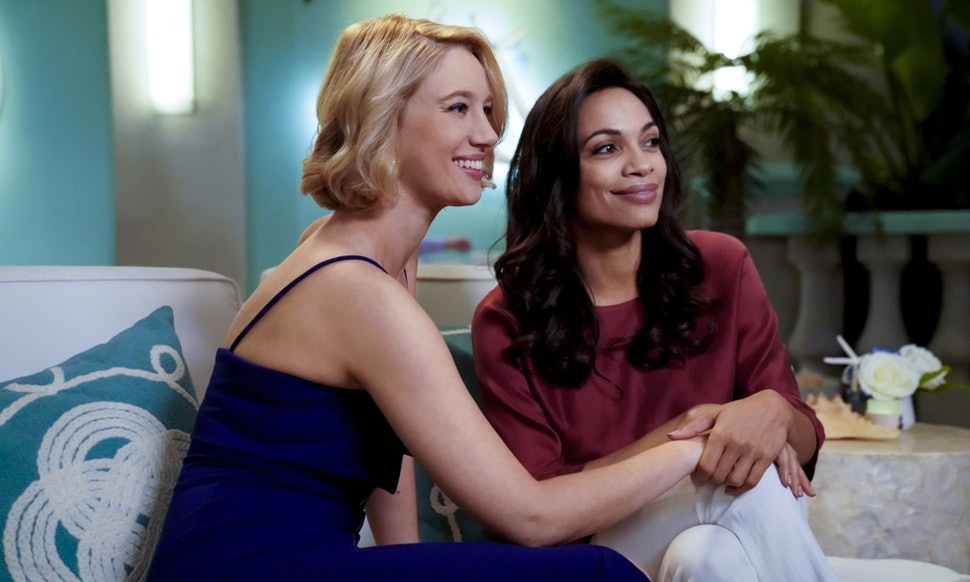
While Jane the Virgin has been rightly critically acclaimed since day one and praised for its revolutionary diversity, it’s always had a complicated relationship with its queer characters. Luisa started off strong but was ultimately relegated to a one-dimensional punchline before essentially disappearing, and Rose was never really fully formed. This year, though, the writers picked up on the long-running fan theory that Petra is bisexual and agreed. Unlike Luisa, Petra actually started out as a caricature and became more layered and complicated as the show went on. Her coming out journey was essentially realizing she’s into women because her chemistry with Jane Ramos spawned a sex dream into her subconscious — and then just going for it. The self-revelation, the exploration, even the way she told Jane and Rafael about it was so sweet and sexy and prickly and Petra. Jane the Virgin has gotten better every year, and the surprise of Petra and JR’s storyline was one of the reasons season four was its best ever. — Heather Hogan
7. The Haunting of Hill House Season One (4)
Netflix’s New “Haunting of Hill House” Gave Us a Lesbian Who Lives, Took Our Whole Weekend
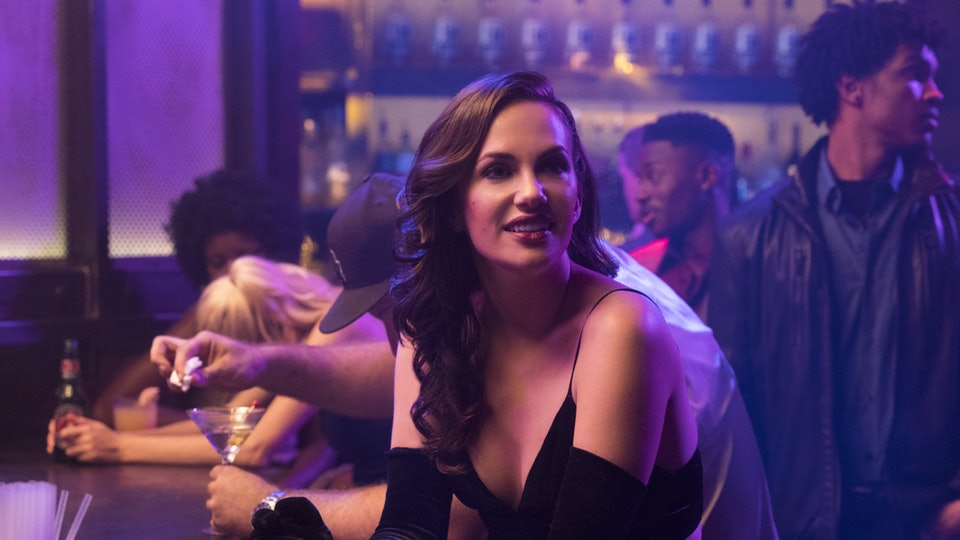
The Haunting of Hill House had a challenge ahead of it with adapting its queer storyline; the original text had one of pop culture’s first recognizably lesbian characters, but preserving her “authentically” would mean falling far short of today’s expectations for representation, as in 2018 we look for more to signify lesbianism than “wears pants” and “is unmarried.” So Haunting gave us Theo, a lesbian character whose sexuality isn’t her whole storyline, but does tie into it; who goes through some wild and traumatizing stuff, but on a level that’s comparable with the also very wild and traumatizing stuff that her straight siblings go through. And in a show where romantic relationships are rocky at best, Theo does manage to both survive and get the girl. —Rachel Kincaid
6. Brooklyn 99 Season Five (6)
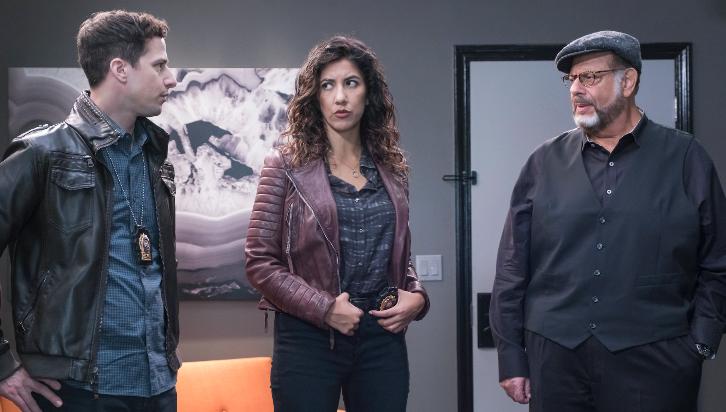
As evidenced by our very own Gay Emmys, this year was a very good year for Stephanie Beatriz and her character Rosa Diaz, who came out as bisexual — like, actually said the word! — on this season of Brooklyn Nine-Nine. The show itself had a good year, too, almost annoying in how persistently it outdoes itself year after year with its annual, always excellent Halloween episode. The Backstreet Boys lineup might go down as one of the greatest comedy cold opens of all time (up there with The Office’s “Fire Drill”). And even though we’re now five seasons into the series, that doesn’t mean the writers are just coasting by on humor that relies on how well we know all of these characters. It still regularly serves up new, emotional character arcs that peel back the layers to this lovable squad, as with Rosa’s personal life developments. Above all else, the show celebrates earnestness and friendship in a really lovely way that proves you don’t have to be mean or cynical to be really fucking funny. — Kayla Kumari
5. One Day at a Time Season Two (6)
“One Day at a Time” Brings Even More Heart and Humor and Gayness to Season 2

There’s an easy reason that One Day at a Time shows up on so many critics’ “End of the Year” Best Lists. It’s quite simply that damn good. One Day at a Time is the most generous, compassionate, loving family sitcom on television. It’s also not afraid to have frank, sometimes dark discussions – PTSD, depression, the fragility of age, the perils of being a young queer teen, the financial struggles of being a working class family in the 21st century. It’s all on the table.
As I wrote in my Season Two review, some of the show’s brilliance comes from leaning into its multi-cam sitcom roots. One Day at a Time uses an old school format, and they are proud of it. They leverage the intimacy and familiarity of the genre to their advantage, luring their audience into cutting edge and weighty conversations from the comfort of the Alvarez’s living room. It’s a stand-out in a class of stand-outs and I would put it against any other comedy on television. In fact, I’ll go further. The fact that One Day at a Time has now gone two years without any acting or writing Emmy nominations is one of the most shaming indictments of the white, male majority of the Television Academy that we have right now. Yes, it’s just that damn good. — Carmen Phillips
4. Pose Season One (13)
“Pose” Is Full of Trans Joy, Resistance, and Love
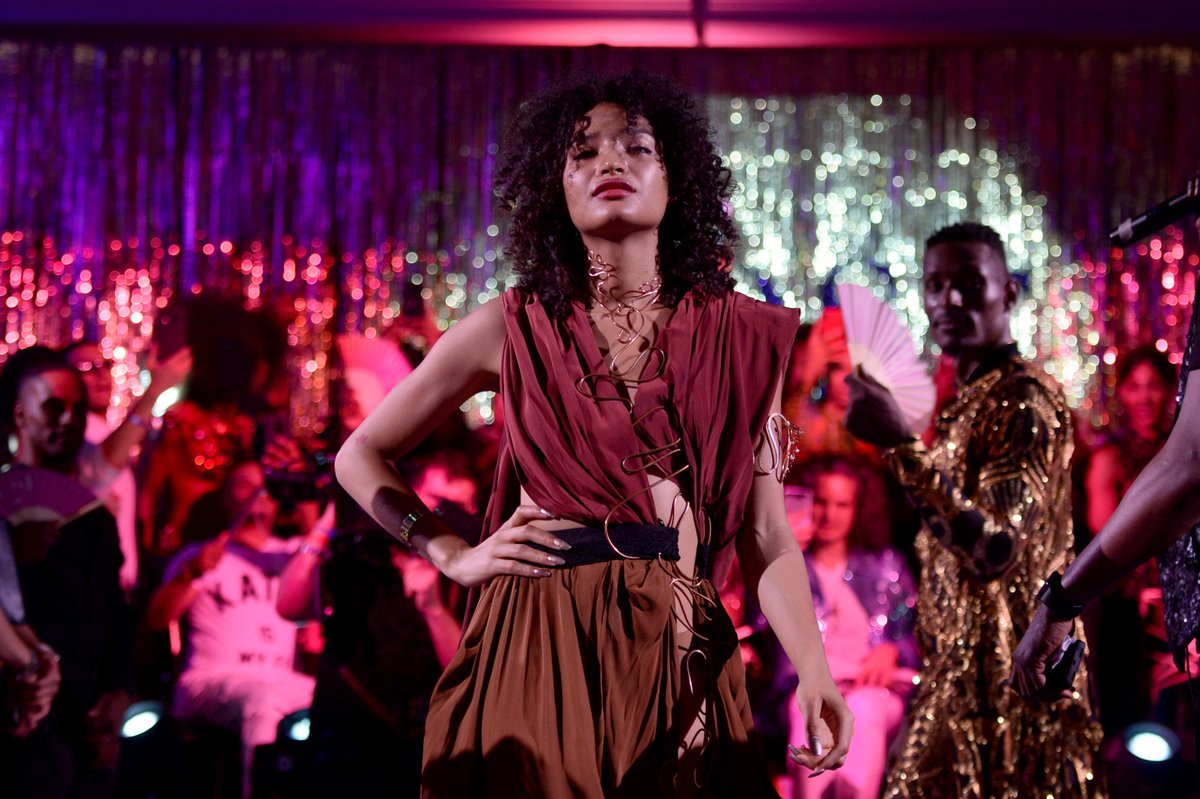
This show just flatly rejected the idea that the best way to tell our stories is slowly, character-by-character, putting one white cisnormative queer in one show and then another show until we somehow achieve critical mass. The problem with that has often been that that’s not how we live — we’re not out here one by one, lone queers in schools/towns/families composed entirely by normals. Enter Pose: a show written by and for trans women of color, set in an era when the only thing louder than the daily trauma of oppression and omnipresent fear of HIV/AIDS were the LOOKS, and all the beautiful ways a body can move to express itself. Pose radiates with a glittery, gorgeous aesthetic and complicated characters. Trans bodies are so often portrayed as somehow tragic or compromised, and Pose — in addition to being a story about real human lives, love, friendship, and “chosen family” — is about the triumph of the body, its ability to mean as much to the world as it does to itself. — Riese Bernard
3. G.L.O.W. Season Two (11)
G.L.O.W. Season Two Doubles the lesbians, Doubles the Fun
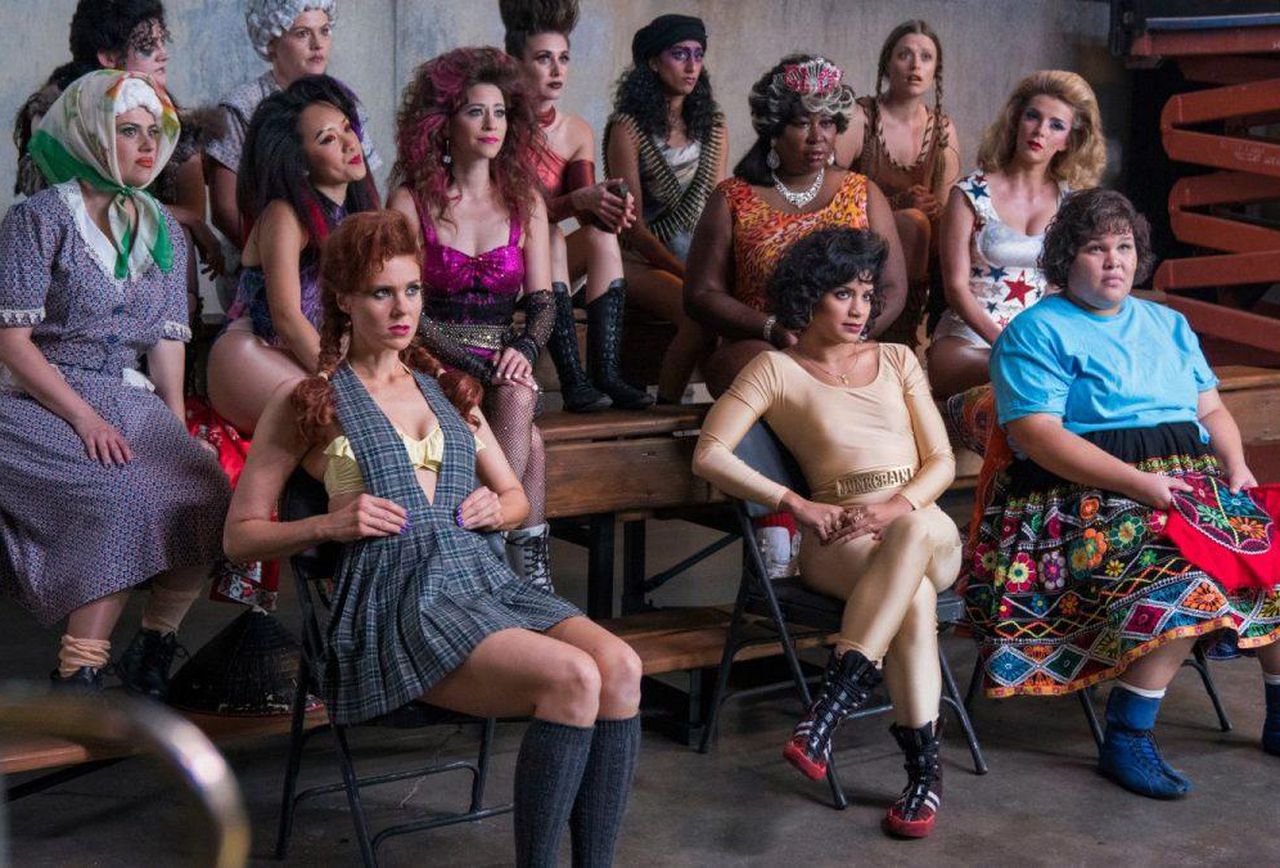
After a first season that bafflingly pursued outlandish homoeroticism yet was seemingly void of homosexuals, Season Two introduced a Latina lesbian fighter and pulled Arthie off the bench for a romantic awakening. G.L.O.W., based on the real-life Gorgeous Ladies of Wrestling, was a delightful mid-summer ride that took a more decidedly feminist bent as the Gorgeous Ladies explored how to advocate for, instead of against, each other, in an industry hell-bent on exploiting women for male fortune. Still, with its electrifying outfits, ostentatious costume drama and carefully-calibrated balance of comedy and drama, it only failed at one thing: an ensemble this dynamic needs longer episodes or a longer season, or both. — Riese Bernard
2. The Good Place Season 3 (12)
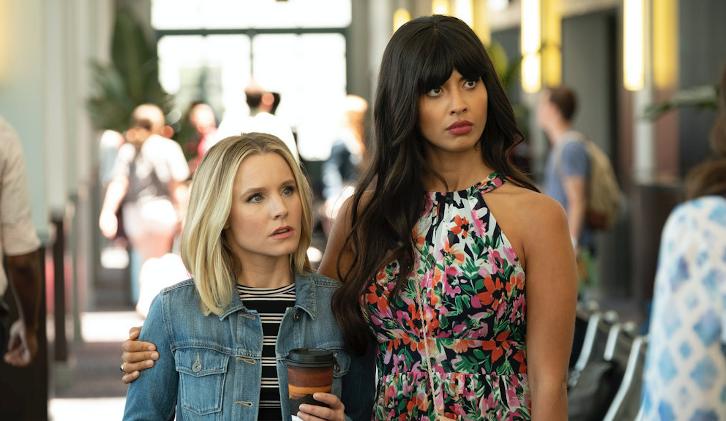
The Good Place, like The Office and 30 Rock before it (although I’m, admittedly, not a 30 Rock fan), has accomplished nothing short of a complete re-imagination of what the half-hour network comedy can be. It’s got everything: prestige sci-fi level world-building, cartoonish aesthetics, highbrow esoteric wit, running gags and plenty of ‘ships. Its premise, writes Sam Anderson in The New York Times, “is absurdly high concept. It sounds less like the basis of a prime-time sitcom than an experimental puppet show conducted, without a permit, on the woodsy edge of a large public park.” And yet it works. And in Season Three, The Good Place amped up Eleanor’s bisexuality and Janet’s particular take on non-binary, and we are so pleased, because that means we can put what will undoubtedly be one of the most legendary television programs of all time on lists like this one. — Riese Bernard
1. Killing Eve Season One (17)
Killing Eve is Your New Queer Obsession

Crescendoing, relentless, all-consuming obsession fuels the narrative of Killing Eve, Phoebe Waller-Bridge’s sexy, smart, distinctly feminine action thriller starring Sandra Oh and Jodie Comer as the toxic spy-assassin duo who can’t stop thinking about each other. Watching Killing Eve feels exactly like that: seering obsession. This category was stacked with great, complex dramas, but there’s something just purely intoxicating about Killing Eve that sets it apart. Though it’s the phrase most often used to describe Eve and Villanelle’s dynamic, “cat-and-mouse” hardly covers what Oh and Comer bring to these characters or what’s even on the page. It’s never quite clear whether they want to murder each other or make out. Hunting each other, longing for each other, Eve and Villanelle might be one of the most complex queer relationships on television. But beyond that dripping subtext, it’s just a very good thriller with compelling twists and turns and sharp edges that refuse to be dulled. — Kayla Kumari Upadhyaya